How Undergraduates Benefit From Doing Research
Undergraduate research isn't just for STEM subjects.
Benefits of Undergraduate Research

Getty Images
Studies show students who participate in research earn better grades, are more likely to graduate and are better equipped for graduate school or careers.
Jessica Stewart understands from personal experience the value of doing research as a college undergraduate. In her junior year at the University of California, Berkeley , Stewart worked with art historian Darcy Grimaldo Grigsby on her book, "Colossal," researching the Suez Canal, Eiffel Tower and other massive art and engineering monuments.
She loved the research so much that she went on to get her Ph.D. in art history. Almost 20 years after working on "Colossal," Stewart now directs the program that gave her the opportunity: UC Berkeley’s Undergraduate Research Apprenticeship Program.
But the initial benefit of doing undergraduate research was even more practical. When she was deciding which projects to apply for as an undergraduate, she got to explore many academic disciplines. This process opened her eyes.
“From the moment I set foot on campus, URAP allowed me to see what kinds of ideas I could study,” Stewart says. “The research and credit are great, but there’s this wayfinding side, too, where students can learn who researchers are, what research looks like and fields they may not have had any exposure to.”
A long tradition at some universities, mentored research projects are now offered at undergraduate institutions around the U.S. While many programs started out focused on science, today most universities offer opportunities across disciplines, including all aspects of STEM as well as architecture, business and theater arts.
No matter the subject area, research participation is an asset for undergrads. Studies show students who participate earn better grades , are more likely to graduate and are better equipped for graduate school or careers.
“It’s often most transformative for nontraditional learners and underrepresented students,” Stewart says. “They learn to triangulate life experience and studies in ways that may not have been intuitive for them. It greatly improves academic performance, retention and persistence.”

Research Roots in STEM
Every year, 6,000 undergraduates participate in research experiences through the National Science Foundation, mostly during the summer. Projects span nearly 20 subject areas , such as astronomy and ocean sciences. Most take place in the U.S., but some research is done abroad, including a marine sciences project at the Bermuda Institute of Ocean Sciences.
Experiences like these increase students’ confidence in their research skills and boost awareness of what graduate school will be like, according to a 2018 study . They also help students identify whether they want to pursue a science career.
“It’s one of the best ways to recruit students into STEM careers and retain them,” says Corby Hovis, a program director at the NSF's Division of Undergraduate Education. “That’s why we do it. It’s an effective way to get students from classrooms into doing STEM.”
The NSF is especially interested in applications from students who might not have had past opportunities to do research, including those who are the first in their families to attend college, and Black and Latino students.
Research institutions apply for NSF grants to mentor undergraduate students and guide them through participation in an ongoing project. For students, the experience includes orientation and training, as well as a stipend and allowances for housing and travel. In most cases, students write a paper about their contribution to research and may even present at a conference or seminar.
Some opportunities require that students have specific math courses under their belts, but all focus on helping students build other skills, aside from lab or research techniques, that they’ll need for future academic work or careers.
“Communicating clearly the results of research is a skill that could carry over into any field,” Hovis says. “The teamwork and cohort experience not only encourages them to continue in science, but (is) translatable to any number of other activities they will do later on.”
Connecting With Faculty
At the Massachusetts Institute of Technology , research has been part of the undergraduate experience for more than 50 years. Some students choose the school specifically for this reason, and more than 90% of students participate. As at other schools, research is part of a bigger initiative around experiential learning, which also includes service learning and study abroad .
The biggest challenge for students is usually figuring out what kind of research they’re interested in.
“We depend on students to do some of that footwork,” says Michael Bergren, director of MIT's Undergraduate Research Opportunities Program. “There are a lot of supports, but at the end of the day a student needs to understand what they’re interested in, who's doing the work they’re interested in and what the steps are to participating in that research.”
But there is hand-holding, if needed. Before applying to work on a project, students have to approach the lead faculty member and introduce themselves.
“This is really intimidating. We don’t take that for granted,” Bergren says. “Part of life skills development is approaching a lab or faculty member and advocating for themselves.”
Peers offer tips about how to navigate that face-to-face encounter, such as find out a faculty member's office hours, send an email with a resume attached and attend a departmental event.
The networking doesn’t stop there. Get to know which graduate students work on the project, talk to other students who might be exploring the same opportunities and make sure you know what the work involves.
“As the research progresses, deliverables amp up,” Bergren says. “You may find you need to put more time into this right when finals are happening.”
The Future of Undergraduate Research
Some undergraduate researchers might share their work at academic conferences or seminars, or even be published in journals. Some might participate in the Council on Undergraduate Research annual conference , the largest symposium of its kind. Every year, more than 4,000 students attend a graduate school and career fair and present work that spans the disciplines.
Students have come to expect that they’ll get a chance to do research as undergrads, says Lindsay Currie, the council's director.
“More recent generations grew up in a different climate. They learned by doing in classrooms,” Currie says. “That, combined with a workforce that expects people to have lived experience, means students want to be able to say that they’ve already done research as part of their coursework.”
What’s next, Currie says, is universities that integrate research into coursework so that students start a project their first year and continue through their time in college. Working with a network of universities, the Council on Undergraduate Research has completed a study of how schools can modify their curricula to incorporate research from the very beginning.
“Starting as freshmen, students would work on research that would build,” Currie says. “This would be significantly more advanced projects that would be consistent across the particular department. This is how they’re going to teach, because they know students benefit from doing.”
Tips to Make Your Final College Choice

2024 Best Colleges

Search for your perfect fit with the U.S. News rankings of colleges and universities.
College Admissions: Get a Step Ahead!
Sign up to receive the latest updates from U.S. News & World Report and our trusted partners and sponsors. By clicking submit, you are agreeing to our Terms and Conditions & Privacy Policy .
Ask an Alum: Making the Most Out of College
You May Also Like
Law schools with the highest lsats.
Ilana Kowarski and Cole Claybourn April 11, 2024

Today NAIA, Tomorrow Title IX?
Lauren Camera April 9, 2024

Grad School Housing Options
Anayat Durrani April 9, 2024

How to Decide if an MBA Is Worth it
Sarah Wood March 27, 2024

What to Wear to a Graduation
LaMont Jones, Jr. March 27, 2024

FAFSA Delays Alarm Families, Colleges
Sarah Wood March 25, 2024

Help Your Teen With the College Decision
Anayat Durrani March 25, 2024

Toward Semiconductor Gender Equity
Alexis McKittrick March 22, 2024

March Madness in the Classroom
Cole Claybourn March 21, 2024

20 Lower-Cost Online Private Colleges
Sarah Wood March 21, 2024

5 Reasons Why Undergraduates Should Do Research
- by Julia Ann Easley
- May 02, 2017
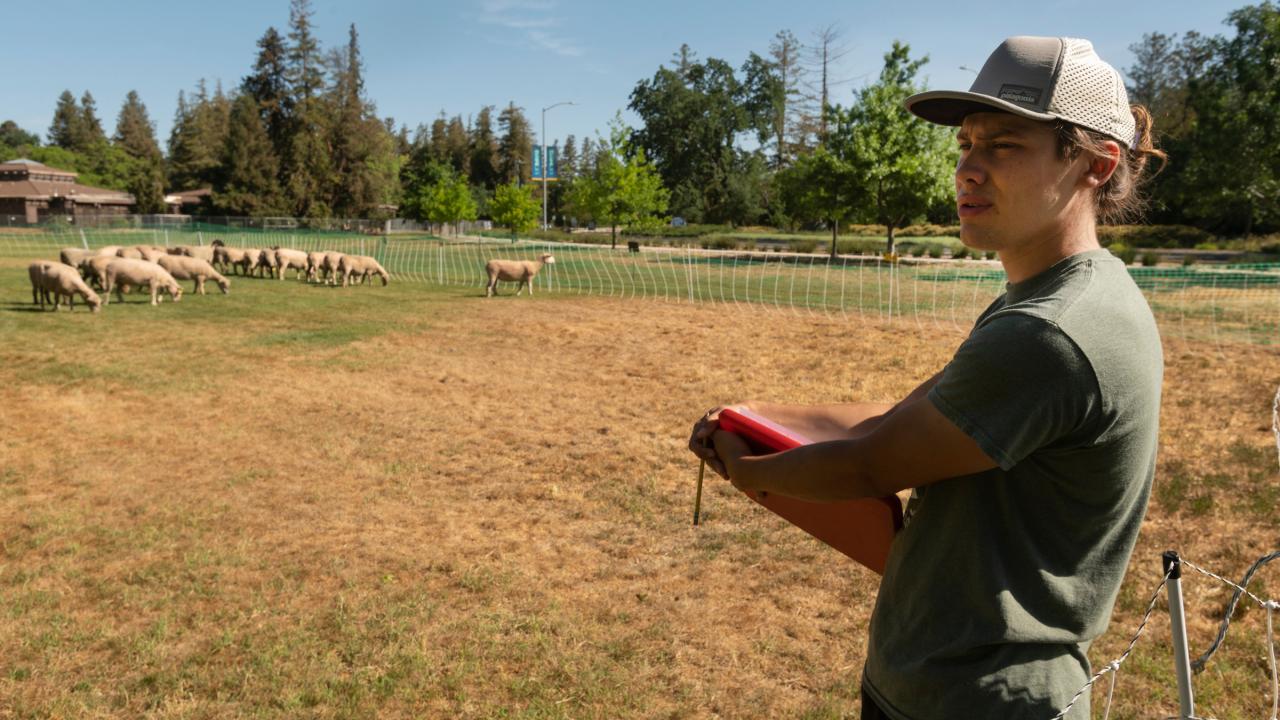
Nearly 40 percent of UC Davis undergraduates participate in hands-on research. On the occasion of the 28th annual Undergraduate Research, Scholarship and Creative Activities Conference on April 28 and 29 — where more than 700 students presented their work — we introduce you to some students and graduates who shared what they’ve gained. Consider how the research experience can benefit you, too.
1. Exploring career directions
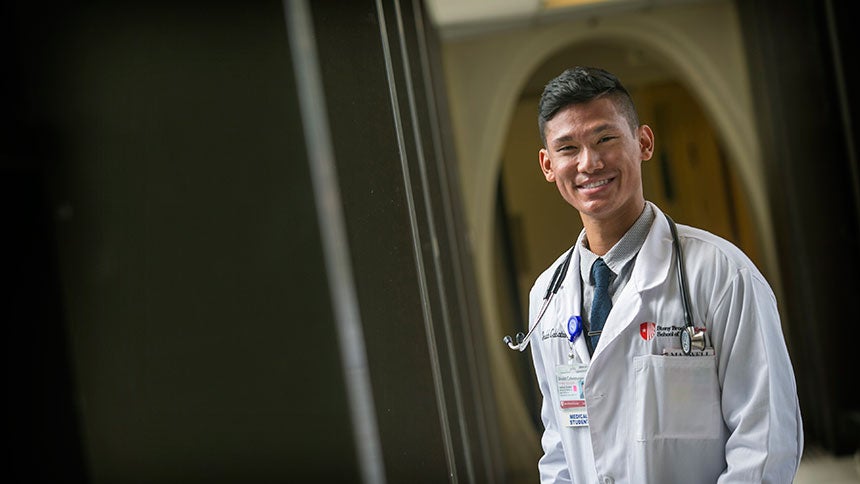
Here is how undergraduate research influenced the direction of three UC Davis students:
Shadd Cabalatungan started his studies at UC Davis aiming for a career as a veterinarian. Touched by his aunt’s diagnosis with breast cancer, he got involved with research at the UC Davis Comprehensive Cancer Center . That experience was key in changing his direction to pursue a medical degree. He also did research on how drinking by college students affects others who don’t drink. With a degree in sociology , he is now completing his first year as a medical student at Stony Brook University.
Graduating senior Rong Ben, once fascinated by the aesthetics of fashion, is geeking out on how technology can be incorporated so fashion helps solve problems. As a junior, this design major did a research internship with a professor working on wearable technology, including gloves to provide a patient’s vital statistics. “It opened up a new view for me,” said Ben. As a participant in the University Honors Program , Ben designed a grab-and-go coat for safety in an earthquake with protective materials, lighting, emergency food and water, and more. Next up for Ben: the graduate program in fashion enterprise and society at the University of Leeds.
Physics major Mario D’Andrea took a course related to climate neutrality to confirm his desire to study physics in graduate school. He worked with two other students to research waste reduction and carbon sequestration through composting. He enjoyed the research, and it helped confirm his desire to study condensed matter physics in graduate school. “I wish more classes were open-ended like this,” he said.
2. Building transferable skills and enhancing resumes
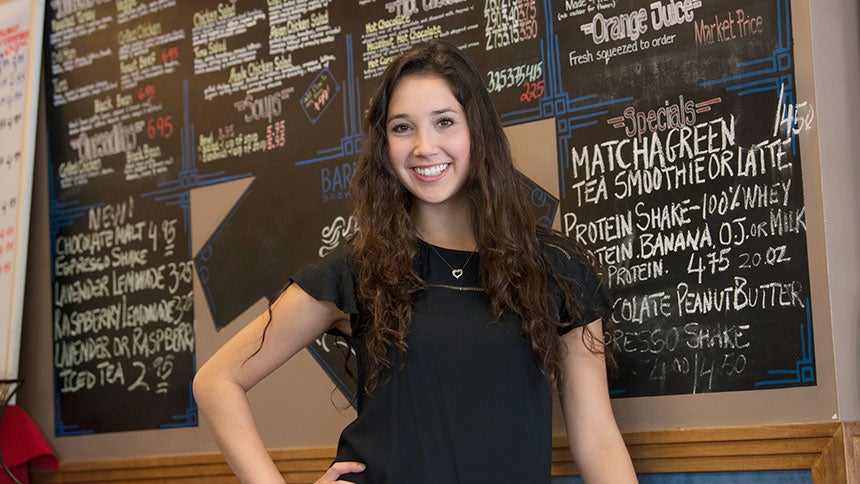
Graduating senior Julie Beppler has learned a lot about food options in downtown Davis. The managerial economics major analyzed how 49 restaurants use menu design to promote certain items. But more than that, she developed and demonstrated skills that employers seek. Beppler first worked as a research assistant and then pursued this project for her Undergraduate Honors Thesis . It focuses on the cost of production and price of featured menu items as well as their relative healthiness. She taught herself computer programing; learned time management; practiced professional communications as she interacted with restaurant managers; and proved her ability to motivate herself and direct her own work.
Beppler will soon start in the management development program at E. & J. Gallo Winery, so take her word that doing research can also help students find a mentor who can provide letters of recommendation and advice to support their success. Kristin Kiesel , a faculty member in agricultural and resource economics and a mentor to Beppler, agreed: “There is no better way to recommend a student than by having them successfully complete an undergraduate research project.”
3. Learning to publicly advocate for and defend work
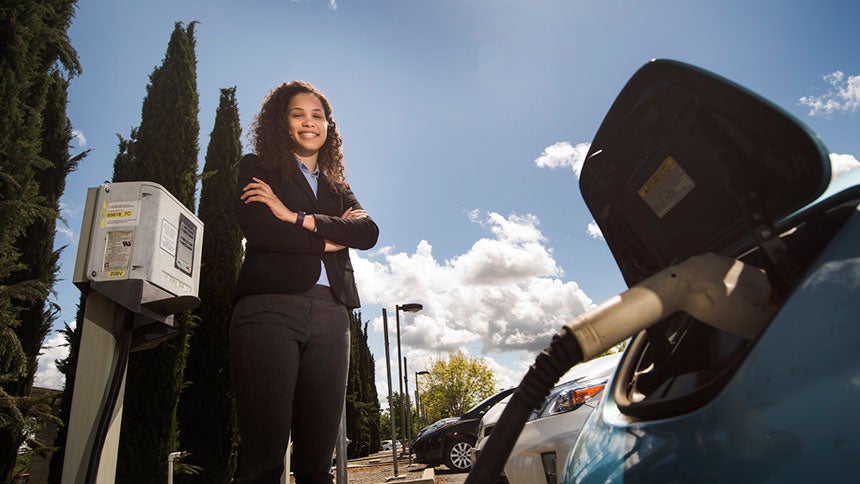
“Nerve wracking.” That’s how graduating senior Kathryn Green described her anticipation of presenting for the first time her research on California’s clean car consumer rebate program. Now she’s a UC undergraduate research ambassador. Last quarter, the political science major participated in the policy program at the UC Center Sacramento , which included classes, an internship with the advocacy organization Environment California and a research project.
Presenting the research was a requirement. Green designed a large poster representing her research and, in a session lasting 90 minutes, explained it one-on-one to attendees. She talked about the process and her policy recommendations not only to policymakers and people from the clean car industry, but also to others who were unfamiliar with the topic. “I became almost a teacher,” said Green. “I took my research and explained it to someone who didn’t know about it.”
Based on her success in that venue, Green represented UC Davis at showcase in Los Angeles earlier in April for alumni, donors, regents and other friends of the University of California. “I’m really proud I got to go down and share my research,” she said.
4. Getting a leg up on graduate or professional school
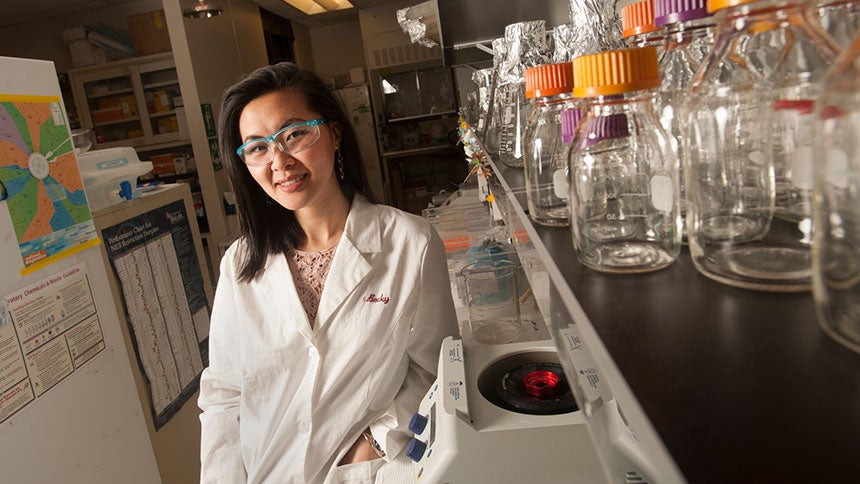
When Becky Fu came to UC Davis in 2008, she was the first in her family to attend college. Nine years later, this genetics and genomics major is preparing to defend her dissertation and graduate from Stanford University with a doctoral degree in genetics and a master’s degree in biomedical informatics. A 2012 graduate from UC Davis, she credits her participation in undergraduate research as foundational to where she is today. “No question about it,” she said. “Without undergraduate research, there would have been no way I got into any of the graduate programs I did.”
As a freshman, Fu heard others talking about research and sought out the Undergraduate Research Center on campus for more information. She went on to do research with two professors; participate in the undergraduate research conference ; publish in Explorations , the UC Davis journal of undergraduate research; be awarded a Provost’s Undergraduate Fellowship to help pay for her research; and win the Chancellor’s Award for Excellence in Undergraduate Research and other awards.
“Having that experience as an undergraduate to fail a lot and expand on the techniques,” Fu said, “was an integral part of being prepared for and getting through the doctoral program.” At Stanford, she is working in the lab of Andrew Fire, who shared the 2006 Nobel Prize for Physiology or Medicine .
5. Contributing knowledge and impacting the world
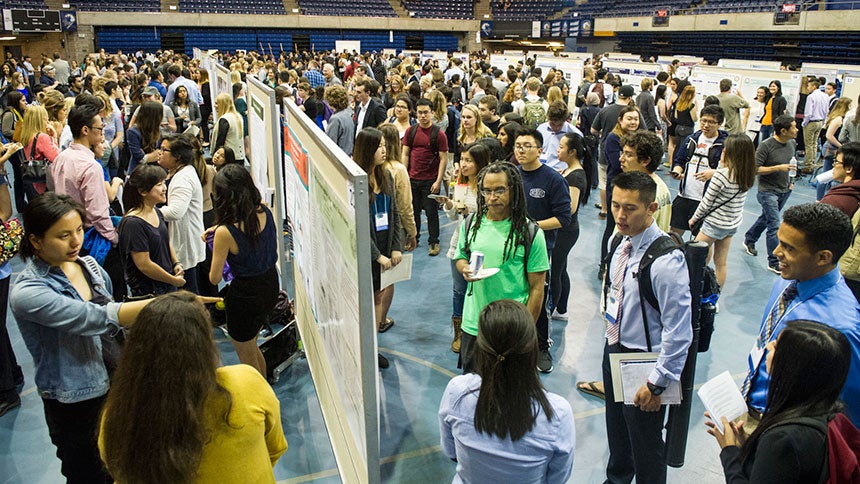
Annaliese Franz, associate professor of chemistry and faculty director of the Undergraduate Research Center , sees students experience the joy of discovery and creation through research. “Students really get the chance to create something new as they go into the lab or out into the field or study new policy.”
Fu, the Stanford student, explained how undergraduate research developed a new quest for her: “I wanted to be contributing to a bigger cause, a bigger realm of intelligence, and that’s advancing medical care in general.”
And Green, who did the research on the clean-car rebate program, discovered a new power. “My research told me that an undergraduate can make an impact,” she said. “You don’t have to have a master’s degree or doctorate to make valuable contributions.”
Julia Ann Easley of News and Media Relations supports communication and writes stories at the heart of the university. Her career includes a noble cause, adventures in learning, working with wonderful people and a beautiful green setting.
Subscribe to our majors blog
Primary Category

- Youth Program
- Wharton Online
Why should you do research as an undergraduate?
Alumni, faculty, and employers answer the question., erika james, dean, the wharton school; reliance professor of management and private enterprise.

When I was a student, I took a short detour to a corporate setting, which was an experience that only reinforced my belief that my true calling was in academia. The lasting professional and personal relationships I have developed through my research have proven to be invaluable, and transformed my life in many ways. Though not every student will pursue a career in academia, all students can benefit greatly from the skills gained through research. The experience will prepare you to think critically, anticipate opportunities and be an effective leader in any industry or endeavor.
Diana Roberson, Vice Dean, Wharton Undergraduate Division; Samuel A. Blank Professor of Legal Studies & Business Ethics

Raveen Kariyawasam, W’22, SEAS’22

Adam Grant, Saul P. Steinberg Professor of Management, Professor of Psychology

I can’t imagine a better way to learn than doing undergraduate research. When I was in college, getting involved in research changed the course of my life. It gave me the chance to explore fascinating questions, soak up wisdom from brilliant mentors, and stretch my creative and critical thinking muscles. I discovered that I loved creating knowledge, not just consuming it.
Dara Cook, W’95

Wendy De La Rosa, Assistant Professor of Marketing

So many consumers, cultures, and organizations have been ignored and under-researched. As a result, so much is still unknown. For me, there is nothing more honorable than being the person who pushes our collective human knowledge forward (even if it is just by a centimeter). You can be that person, and you can start right now, right here at Penn.
Michael Roberts, William H. Lawrence Professor of Finance

Nancy Zhang, Professor of Statistics and Data Science, Vice Dean of Wharton Doctoral Programs

Geoffrey Garrett, Former Dean and Reliance Professor of Management and Private Enterprise, The Wharton School

Debi Ogunrinde, C’16, W’16

Paul Karner, C’03, W’03

Ashish Shah, W’92
My undergrad experience prepared me for success in a crisis that few expected and fewer were prepared for. When at Wharton, I was fortunate enough to conduct research in two completely different areas of finance. Read more
Kate Lakin, Putnam Investments

Julio Reynaga, C’13, W’13

Katherina M. Rosqueta, WG’01, Founding Executive Director, Center for High Impact Philanthropy, University of Pennsylvania

Joseph Wang, C’13, W’13

Nada Boualam, C’17, W’17

Thank you for visiting nature.com. You are using a browser version with limited support for CSS. To obtain the best experience, we recommend you use a more up to date browser (or turn off compatibility mode in Internet Explorer). In the meantime, to ensure continued support, we are displaying the site without styles and JavaScript.
- View all journals
- Explore content
- About the journal
- Publish with us
- Sign up for alerts
- CAREER COLUMN
- 15 March 2019
A student’s guide to undergraduate research
- Shiwei Wang 0
Shiwei Wang is a junior undergraduate student studying Integrated Science and Chemistry at Northwestern University in Evanston, Illinois. Twitter: @W_Shiwei
You can also search for this author in PubMed Google Scholar
I have thoroughly enjoyed my experience working in a materials-chemistry laboratory at Northwestern University in Evanston, Illinois, for the past two years. Being able to mix an undergraduate education with original research in a proper laboratory has been a fantastic opportunity.
Access options
Access Nature and 54 other Nature Portfolio journals
Get Nature+, our best-value online-access subscription
24,99 € / 30 days
cancel any time
Subscribe to this journal
Receive 51 print issues and online access
185,98 € per year
only 3,65 € per issue
Rent or buy this article
Prices vary by article type
Prices may be subject to local taxes which are calculated during checkout
doi: https://doi.org/10.1038/d41586-019-00871-x
This is an article from the Nature Careers Community, a place for Nature readers to share their professional experiences and advice. Guest posts are encouraged. You can get in touch with the editor at [email protected].
Wang, S. et al. Preprint at ChemRxiv https://doi.org/10.26434/chemrxiv.7824707.v2 (2019).
Download references
Related Articles

Bring training forward for undergraduate researchers

How I harnessed media engagement to supercharge my research career
Career Column 09 APR 24

Ready or not, AI is coming to science education — and students have opinions
Career Feature 08 APR 24

How we landed job interviews for professorships straight out of our PhD programmes
Career Column 08 APR 24
Brazil’s postgraduate funding model is about rectifying past inequalities
Correspondence 09 APR 24
Declining postdoc numbers threaten the future of US life science
Husbandry Technician I
Memphis, Tennessee
St. Jude Children's Research Hospital (St. Jude)
Lead Researcher – Department of Bone Marrow Transplantation & Cellular Therapy
Researcher in the center for in vivo imaging and therapy, scientist or lead researcher (protein engineering, hematology, shengdar q. tsai lab), lead or senior researcher - flow cytometry.
Sign up for the Nature Briefing newsletter — what matters in science, free to your inbox daily.
Quick links
- Explore articles by subject
- Guide to authors
- Editorial policies

Princeton Correspondents on Undergraduate Research
Why Do We Research?

If you are reading this post, you are likely involved in research. Unsurprisingly, I am too. Yes, I’ve spent my fair share of long nights on the A floor of Firestone, reviewing sources and tightening up arguments. This week, I’m embarking on a new history research paper about the evolution of Native American spirituality from the 1830s to the 1890s, which I anticipate will take a fair amount of time. Reflecting on the work I have ahead got me thinking, why am I doing this in the first place? In fact, why do any of us research?
This question can really be broken into two parts: “What do we hope to achieve from our research?” and “What motivates us to conduct our research?” We think about the first question often, because in the academy, we have to justify what we’re doing to our professors, to funding boards, etc. And in lots of research, one’s answer to the first question informs their answer to the second. Certain biologist friends of mine, for instance, study lab rat carcasses in the hopes of better understanding tumors, with the inspiring goal of curing cancer. In cases such as this, the aim of a project is to arrive at something with a concrete application so marvelous that it motivates the researcher to come to the lab each morning.
Similarly, in the social sciences, the motivating goal of research is societal optimization. Economists strive to understand how we as individuals, firms, and nations can most efficiently allocate our scarce resources to make the most of this precious life. Psychologists and sociologists analyze human motivations and behaviors, so that we can understand how we function and organize our lives accordingly. And, many political scientists and public policy researchers study our laws and systems of government with an eye toward tackling problems and implementing concrete solutions. Again, the noble aims of such research provide the motivation necessary to conduct it.
But what about research in the humanities? This realm of inquiry does not seem to concern itself with the material or technological advancement of humanity–the ‘goal’ is less tangible. This brings us back to the second overall question posed at the beginning of this post: w hat motivates us to conduct humanities research?
Research can be goal-oriented, as discussed previously, or grounded in the process. Humanities research is often the latter: we hope to gain a personal appreciation for the immense value and power of ideas. The notion of truth- seeking , a common justification for more theoretical research, implies the high value of the truth being sought —after all, we wouldn’t spend long hours in the library “seeking the truth” if we didn’t think it’d be worth it in the end.
Regardless of our end goal (or lack thereof), rewards are built into the research process. Before we can research, we must learn about our subject area. In the case of my history paper, I received background information on Native American life in the 1800s through lectures from various historians. Grappling with their ideas, a vital part of my research, has been both a challenge and a reward. Indeed, as I learned while researching for this article, new findings in psychology suggest that learning makes humans happier . So, next time you’re dreading working on a research paper, try to remember that you’ll learn something, which will make you happier!
Finally, in addition to making us happier or providing us with a personal sense of meaning, research also expresses something about who we are as a scholarly community. Research is a collective enterprise, and thus everything we do as researchers exists in the context of our fellow researchers–who are often attached to universities. As participants in the university system, we are at the forefront a collaborative, decentralized experiment in personal freedom of thought and action dating back to the 13 th century . This is just as true in the humanities as it is in the hard or social sciences, as we have a shared desire to bring the best ideas of humankind to light. And I think that’s pretty cool.
We all have our own private reasons for researching, too. As a student of history interested in public service, I hope to learn from the mistakes of the past by studying the intricacies of their causes and effects. The United States’ policies towards Native Americans in the 1800s were, in general, morally abhorrent–so studying them is actually a useful exercise in learning how not to conduct public policy. I encourage my fellow Princeton students to devote some time to thinking about the “big picture” of their research, also keeping in mind what we’re participating in as a social movement and why it matters. After all, the grades we receive on our research papers will soon fade from our memories—but these feelings of purpose, meaning, and connection to the academic tradition will be with us forever.
–Shanon FitzGerald, Social Sciences Correspondent
Share this:
- Share on Tumblr


Choose Your Test
Sat / act prep online guides and tips, how to do college research right: step-by-step guide.
College Admissions , College Info

College research can be an overwhelming task, and it's not easy to know where to begin. In this article, I'll help you sort through your options and find your dream college.
If you work through the following four steps, you'll be well on your way to compiling a list of schools that fulfill all your most important criteria:
- Identify your priorities
- Search with an online college finder
- Consider your chances of admission
- Finalize your list
In the next few sections, we'll cover how to research colleges in a straightforward and effective way.
Step 1: Identify Your Priorities and Preferences
The first step in tackling the college search process involves thinking about what you want out of your college experience. There are some essential qualities that differentiate colleges from one another that you should consider first, such as location, size, cost, and academic programs. You should also contemplate what you want out of the social scene and academic climate at your college. Then, you can search for schools that fit your needs across a variety of different dimensions.
Primary Factors
Here's a list of the first four factors you should consider when searching for colleges:
#1: Location
Do you want to be far away or close to home? Attending an in-state school can mean a lower tuition price, but it may stunt your college experience if you continue to rely on your family and old friends. You should also consider whether you're interested in a rural, urban, or small town college environment. The surrounding area can have a big impact on your happiness and comfort level.
Large and small colleges often have very different vibes. You're more likely to get personalized attention at small colleges , but they might have fewer resources and less diversity amongst students. You should research each college individually, but there are certain characteristics shared by most large or small colleges that might lead you to prefer one type over the other.
#3: Academics
You're going to college primarily to learn stuff, so academics should be up there on your priority list. Just how serious of an academic environment are you looking for? Do you want a school that focuses on undergraduate teaching or research? What types of programs interest you? If you have any ideas about your potential major, keep that in mind as you search for schools so you can apply to places that offer the best programs for you.
Selectivity and reputation also come into play here. Based on your test scores and GPA, you can predict your admissions chances at different schools (more about this later). It's advantageous for you to attend the most competitive school possible based on your stats. This will provide you with the greatest number of opportunities both in college and in your post-graduate endeavors.
Tuition prices are something you should think about in your college search, but don't let a high price prevent you from applying if you really love a school. Right now, you should just work on determining whether cost is an issue for you. If so, focus your search on schools that offer generous financial aid and merit scholarships . You can also investigate colleges with no application fees.

Secondary Factors
This list goes into some other factors to think about in your college search that are less fundamental but can still have a really strong influence on your experience.
#1: Social Scene
This is a vague term, but you should have some idea of what type of social environment you're looking for in college. Do you want to be at a party school? Or are you more of a library-all-day-every-day type? Are you at all interested in Greek life? Do you want to be able to go out to bars and clubs? Make sure the environment at the school you choose will be a fun place for you to spend four years.
#2: Housing
Is it important to you to have a really nice dorm? Do you want to be able to live off campus at some point? Schools may offer more or less variety in housing, so this is definitely worth considering. Universities located in rural areas may have fewer options for living off campus.
Are you looking for a school with lots of dining options? This is important to consider especially if you have special dietary preferences or requirements. Whatever accommodations you need, make sure the schools you choose have the ability to provide them.
#4: Extracurriculars
Think of any extracurricular activities you want to pursue in college. If these are priorities for you, you should ensure that any schools that you're considering have the appropriate resources. Extracurriculars are a huge part of the college experience for most students, and they provide a great social outlet outside of the party scene and classes.
#5: Athletics
If you're hoping to play a sport in college for fun, you should make sure that anywhere you apply will give you that opportunity. Are you planning to work out in college? If this is a priority for you, look for schools that have high-quality athletic facilities and give students full gym access. Many schools offer exercise classes for students at their gyms, which is a really nice perk.
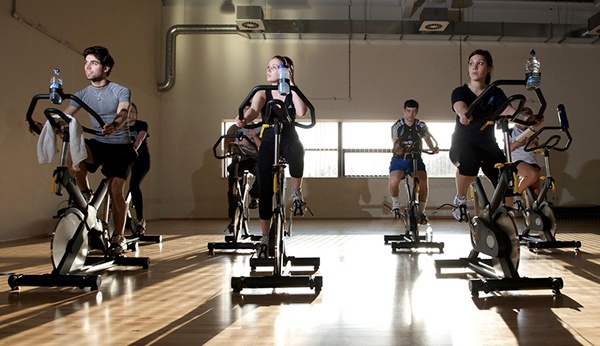
As you consider these factors, you can continue to customize the priority order to fit your needs. Some of the factors I listed as "secondary" might actually be of primary concern to you. If you feel that something is a priority, don't discount it just because other things are "supposed" to be more important. You may even be totally indifferent to some of the factors I've listed (for example, "athletics" are a foreign concept to us hardcore nerds). That's fine too! You can choose to ignore these factors in the next step.
Now that you're armed with your preferences and priorities, it's time to start your college search for realz.
Step 2: Search for Schools Using an Online College Finder
After you've figured out your preferences, the easiest way to find schools that you like is to use an online college finder tool to search based on your criteria.
One option that you might consider initially is College Navigator . You can specify location, size, major program, public or private, tuition, test scores, and more in your search. This tool will give you all the statistics on different schools and help you locate options that seem like the right fit. As you investigate the results of your search, add schools to your "favorites" and compare them side by side to see how they differ. This might eliminate some options based on factors like cost and admissions rate.
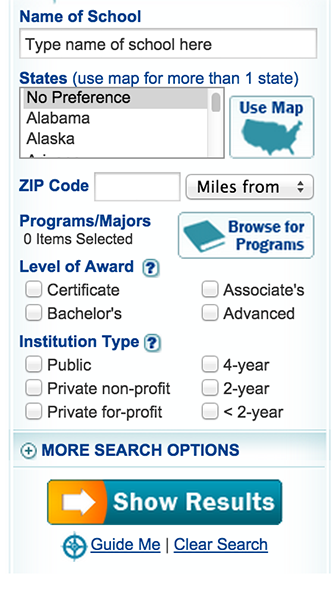
Another site to investigate is Cappex . Cappex is a college matchmaking site where you can fill out a profile and get matched up with schools that align with your preferences. The site provides suggestions for schools that you might like after you complete your profile. It has a pretty complete overview of each school including student reviews and information about campus life that might not be included in the College Navigator statistics.
If you find schools that you like, you can add them to your running list and compare them against each other. Cappex also links directly to the application pages for schools on your list of favorites, so you can check out what materials you're expected to submit.
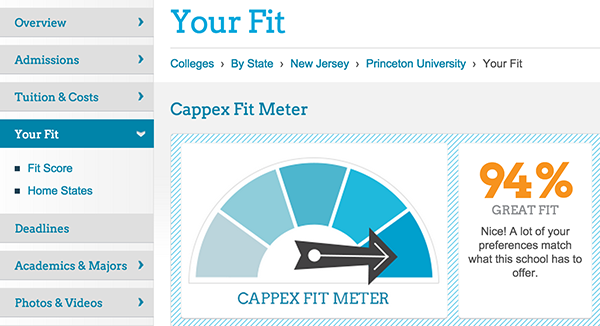
There are also a number of other sites you can use at this stage. The link at the beginning of this section will take you to my reviews of the ten best college search websites. Feel free to use whichever one seems most accessible to you!
Step 3: Consider Admissions Chances and Reputation
Once you've figured out what you want from a college and have gotten some solid suggestions from search sites, you should step back and take an objective look at your results. It's important to maintain realistic expectations in the college application process, so you should choose schools where you have reasonable chances of admission.
Though the sites I mentioned above may give you statistics for a school's average test scores and GPA, it's difficult to understand your chances of admission just by looking at statistics. I would recommend that you Google "(name of school) PrepScholar admissions requirements" to access our database pages about each school. Use the tools on these pages to enter in your GPA and SAT scores and calculate your chances of admission.
In general, if your chances are below 30 percent the school qualifies as a reach school . A school with an admissions rate that's below 15 percent is a reach school for all students regardless of scores and GPA. If all or most of the schools you're interested in are reach schools, it's time to adjust some of your criteria to allow for other options. Only a third of the colleges where you apply should be reaches.
This is also a good time to check ranking lists like US News and Forbes to see whether the colleges that interest you have decent reputations. However, be careful when considering these rankings! If two schools are within ten or so ranks of each other, there probably isn't much of a difference in quality between them.
Rankings are a tool to be used after you've already picked out schools based on other factors. If you're trying to decide between two schools and the lower ranked school is a much better fit for you, then you should still apply to that one. Rankings are more of a tie-breaker to be used when all other measurements are equal. Prestige can be important because it generally means a more intellectual student community and greater academic opportunities, but you should put your personal goals and priorities above the prestige of the school.
After consulting these resources, you'll end up with a better sense of the quality of your preliminary list of schools. This leads to the next step, making your final college list!
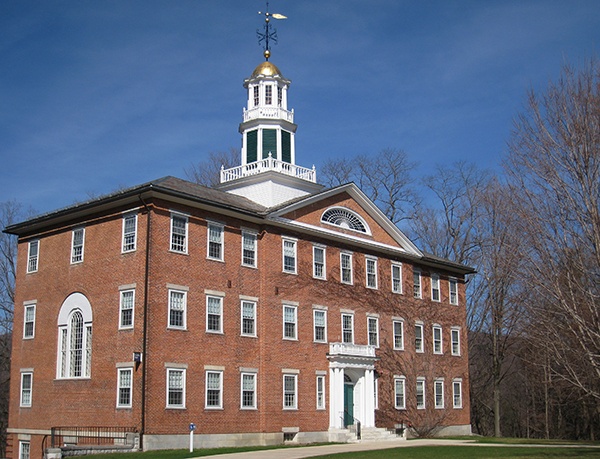
Step 4: Make a Final List
Now that you've gathered all of this information, it's time to tweak your list of schools so that it has a nice balance of different options. As I mentioned in the previous section, it's important to have reach schools, but they should only make up about a third of your list. Another third of the schools should be likely options, and the last third should be safety schools .
You can use the same process as above to look up potential likely and safety schools and check your admissions chances. Safety schools are schools where you have at least an 80 percent chance of admission. Likely schools are schools where you have a 30 to 80 percent chance of admission. These can be further divided into "possible" and "probable" options. Possible options will be in the 30-50 percent range, and probable options are between 50 and 80%.
Most students end up applying to around 5-8 colleges in total. Start out with three schools in the reach category, three in the likely category (two probable and one possible), and three in the safety category. Then, if you find that you're overwhelmed by the application fees or the supplementary essays, you can always cut out 2-3 schools. Be honest about whether you can realistically see yourself attending all of the schools on your list.
You should also do some research to check whether the schools on your list use the Common Application or if they require you to fill out separate applications. This can have a big impact on the time you spend on the process. You might decide to eliminate a school from your list if you're not super attached to it and it's the only option that requires an individual application.
Once you've balanced your list, begin brainstorming your application essays and deciding which accomplishments and activities you want to highlight for colleges. Read this article about how to create a versatile application for some more tips!

What's Next?
Now that you know how to do research colleges, you should also be able to put it into practice. Learn more about the application deadlines that will be most critical for you.
College ranking lists can be helpful tools if you use them in the right way. Find out about all the college ranking lists you should read and how much you should rely on them.
Looking to attend a top-notch liberal arts school? Here's a list of the 28 best liberal arts colleges in the country.
Want to improve your SAT score by 160 points or your ACT score by 4 points? We've written a guide for each test about the top 5 strategies you must be using to have a shot at improving your score. Download it for free now:

Samantha is a blog content writer for PrepScholar. Her goal is to help students adopt a less stressful view of standardized testing and other academic challenges through her articles. Samantha is also passionate about art and graduated with honors from Dartmouth College as a Studio Art major in 2014. In high school, she earned a 2400 on the SAT, 5's on all seven of her AP tests, and was named a National Merit Scholar.
Student and Parent Forum
Our new student and parent forum, at ExpertHub.PrepScholar.com , allow you to interact with your peers and the PrepScholar staff. See how other students and parents are navigating high school, college, and the college admissions process. Ask questions; get answers.

Ask a Question Below
Have any questions about this article or other topics? Ask below and we'll reply!
Improve With Our Famous Guides
- For All Students
The 5 Strategies You Must Be Using to Improve 160+ SAT Points
How to Get a Perfect 1600, by a Perfect Scorer
Series: How to Get 800 on Each SAT Section:
Score 800 on SAT Math
Score 800 on SAT Reading
Score 800 on SAT Writing
Series: How to Get to 600 on Each SAT Section:
Score 600 on SAT Math
Score 600 on SAT Reading
Score 600 on SAT Writing
Free Complete Official SAT Practice Tests
What SAT Target Score Should You Be Aiming For?
15 Strategies to Improve Your SAT Essay
The 5 Strategies You Must Be Using to Improve 4+ ACT Points
How to Get a Perfect 36 ACT, by a Perfect Scorer
Series: How to Get 36 on Each ACT Section:
36 on ACT English
36 on ACT Math
36 on ACT Reading
36 on ACT Science
Series: How to Get to 24 on Each ACT Section:
24 on ACT English
24 on ACT Math
24 on ACT Reading
24 on ACT Science
What ACT target score should you be aiming for?
ACT Vocabulary You Must Know
ACT Writing: 15 Tips to Raise Your Essay Score
How to Get Into Harvard and the Ivy League
How to Get a Perfect 4.0 GPA
How to Write an Amazing College Essay
What Exactly Are Colleges Looking For?
Is the ACT easier than the SAT? A Comprehensive Guide
Should you retake your SAT or ACT?
When should you take the SAT or ACT?
Stay Informed
Get the latest articles and test prep tips!
Looking for Graduate School Test Prep?
Check out our top-rated graduate blogs here:
GRE Online Prep Blog
GMAT Online Prep Blog
TOEFL Online Prep Blog
Holly R. "I am absolutely overjoyed and cannot thank you enough for helping me!”

- Students & Faculty
- Health Center
- College of Chiropractic
- College of Health Sciences
- Degrees & Certifications
- Continuing Education
- University Catalogs
- Academic Calendar
- Internships & Clinical Experience
- Admission Requirements
- Tuition & Costs
- Financial Aid & Scholarships
- Open House Schedule
- Visit Campus
- How to Apply
- Request Information
- Admissions Team
- For Parents
- For Advisors & Counselors
- Application for Admission
- Student Organizations
- About Kansas City
- Campus Safety
- Academic Support and Access Services
- Registrar’s Office
- Maps & Directions
- The Cleveland Story
- CUKC at a Glance
- Board of Trustees
- Administration
- Accreditation
- Consumer Information
- University Policies
- Contact CUKC

The Importance of Research to Your College Experience
Tags: college experience , college financial aid , importance of research
When preparing for college, one aspect of college life many students don’t think about is the importance of research. Consider, however, what it would be like if the space travel industry ceased all investigative efforts, or carmakers stopped imagining how to make highway travel safer. The same is true for the health sciences.
Without research, advancements that have improved lives and saved countless others may have never happened. College students can gain vital insights about new ways and methods by seeking out research opportunities, which take the college experience to an entirely new level.
The Importance of Research Activities to Employers
It’s reasonable to ask if research has an appropriate place within the undergraduate curriculum . Published findings suggest that participating in undergraduate research activities benefits students, faculty mentors, the university, and eventually, society. The scientific community and companies that value innovation place great value on research performed at primarily undergraduate institutions.
For universities, a research component within an area of study allows for a broader educational experience. Students seeking a comprehensive college experience can explore the effects of applying new thought processes through study and testing. Students can use that experience to see the practical application of their classroom experience represented in research projects.
The Importance of Research at Cleveland University-Kansas City (CUKC)
Cleveland University-Kansas City, a chiropractic and health sciences University, is a proponent of students participating in various research studies.
Dr. Mark Pfefer, director of research at CUKC, coordinates the involvement of students in various projects. Students have the opportunity to take an active role in research projects, which helps them learn proper investigative techniques. He said CUKC students had been co-authors on publications and presentations.
“Students are taught strategies to search for information, plus how to assess the quality of the information found,” he said. “Our students learn much about critical appraisal skills.”
Research: Make it Part of Your College Experience
Students interested in research at CUKC are mentored by faculty and assist in various ways:
- Literature searching
- Data collection
- Manuscript development.
The collective work between students and administrators has proven to be a successful strategy. Pfefer says research efforts at CUKC will continue to expand.
You’ll Find Value in Research
Although time in the classroom is invaluable, having access to an on-site research department is equally essential, Pfefer says. Students can grow and challenge their predecessors’ boundaries in the field. They are encouraged to think beyond the status quo and be open to the possibilities research can reveal.
By engaging outside the classroom that challenges them, students can become better healthcare professionals.
Time spent in research activities will also have a positive impact on their future. Research can light the fire of curiosity that will continue throughout a professional career, and there is no end to what can be learned.
Your College Experience at Cleveland University-Kansas City (CUKC)
CUKC is a private, nonprofit, chiropractic and health science university in Overland Park, Kansas, a major suburb of Kansas City.
Along with offering a Doctor of Chiropractic (D.C.) degree, CUKC offers a B.S. in Human Biology, a B.S. in Exercise Science, and an M.S. in Exercise Physiology.
CUKC also offers an A.A. in Biological Sciences and two-year degrees in Occupational Therapy Assistant and Radiologic Technology.
Research can be a powerful part of the college experience at CUKC. Curious about the topics and issues our students and faculty are exploring? Check out this research blog .
Get more information about the importance of research by connecting with an admissions advisor . Download our free eBook to help you plot your college plan: Your Guide to Navigating College Financial Aid .
Get Email Alerts!
- Full Name * First Last
- Email Address *
- Doctor of Chiropractic
- Concurrent DC/BS Program
- Master of Science in Health Education and Promotion
- Master of Science is Exercise Physiology and Sports Performance
- Bachelor of Science in Human Biology
- Bachelor of Science in Exercise Science
- Associate of Arts in Biological Sciences
- Associate of Applied Science in Radiologic Technology
- Workplace Health Promotion Certificate
- Certificate in Sports Performance
Shape the Future of Healthcare
The School Code for Cleveland University-Kansas City is 014438 .
Diverse fields of study that share one common goal: enriching the lives of others.
- Strategic Plan 2021-2025
- Learn about the College
- Meet the Dean
- History of the College
- Dean's Lecture Series
- Environmental Health Sciences
- HHD Commitment to Diversity, Equity and Inclusion
- HHD Diversity Focused Student Organizations
- Undergraduate Student Organizations
- Graduate Student Council
- Connect with Alumni in Your Major
- HHD Alumni Society
- Join the Alumni Mentoring Program
- HHD Instagram Ambassadors
- Undergraduate Student Profiles
- Graduate Student Profiles
- Alumni Profiles
- Faculty and Staff Profiles
- Volunteer Leaders
- College Awards
- Alumni Society Awards
- Administrative Offices
- Discover HHD
- College News and Events
- Commencement
- Explore HHD Majors and Minors
- Diversity and Inclusion
- Summer Session
- Visit and Apply
- Accepted Students Programs
- New Student Orientation
- Dean's Welcome Meeting
- LEAP - Incoming First-Year Student Program
- Advising Information
- Schedule an Advising Appointment
- Financial Aid and College Scholarships
- Support Resources
- Student Organizations
- Diversity-Focused Student Organizations
- HHD Alumni Mentoring Program
- HHD Leadership Initiative
- Internships
- Honors Programs
- Research Experiences
- Global Experiences
- Career and Professional Development
- Find Your Career Area by Major
- Career Services at Penn State
- Student Profiles
- Experience Student Life through Instagram
- Alumni Groups and Programs
- Parents and Family Association
- Academic Integrity
- Prerequisite Override Form
- File Your Intent to Graduate
- New Student Orientation Program (NSO)
- Undergraduate News
- Degree Programs
- Dual-Title Degree Programs
- Graduate Living at Penn State
- Faculty Mentors
- Funding Opportunities
- Student Experience
- Graduate Student Life
- Career Opportunities
- Diversity Focused Student Organizations
- Ceremony Information
- Undergraduate Degrees
- Graduate Programs
- Professional and Personal Development Programs
- Youth and Families
- Courses with Short-term Travel Experience
- Faculty Resources
- Return to Research
- Research Office
- Biomarker Core Laboratory
- Methodological Consulting
- Penn State Central Research Support
- Research News
- College Departments
- Research Centers
- Graduate Research
- Undergraduate Research
- Research Network - Pure Database
- Discover HHD Research
- Research News and Events
- Join the Alumni Association
- Benefits of Membership
- Update Your Contact Information
- Alumni Career Services
- LionLink Career Connections
- Young Alumni Ambassadors
- Ways to Get Involved
- Mentor a Student
- Attend an Alumni Event
- Join the HHD Alumni Society
- Philanthropy Council
- Experience Student Life Through Instagram
- Connect with Professionals in Your Field
- Discovery, the HHD Magazine
- HHD Alumni Society Awards
- Distinguished Speaker Series
- Career Spotlights
- Parents and Families Association
- Alumni Association Student Membership
- Make a Difference in Student Need
- Alumni News
- Give to HHD
- Communications and Marketing
- Development and Alumni Relations
- Diversity, Equity and Inclusion
- Finance and Accounting
- Human Resources
- Information Systems and Services
- Center for Student Advising and Engagement
- Graduate Education
- Online Education and Outreach
- Undergraduate Programs
- Biobehavioral Health
- Communication Sciences and Disorders
- Health Policy and Administration
- Hospitality Management
- Human Development and Family Studies
- Kinesiology
- Nutritional Sciences
- Recreation, Park, and Tourism Management
- Center for Childhood Obesity Research
- Center for Health Care and Policy Research
- Center for Healthy Aging
- Edna Bennett Pierce Prevention Research Center
- Center for Safe and Healthy Children
- Dean's Office
- Information Systems and Services (ISS)
- Research and Graduate Education
- Faculty and Staff Resources
- Computing Support/IT Help
- HHD Digest - Submission and Archive
- Communications Training and Resources
- Powerpoint Templates
- Zoom Virtual Backgrounds
- Emergency Planning
- Contacts/Directory

Why and When to Do Undergraduate Research
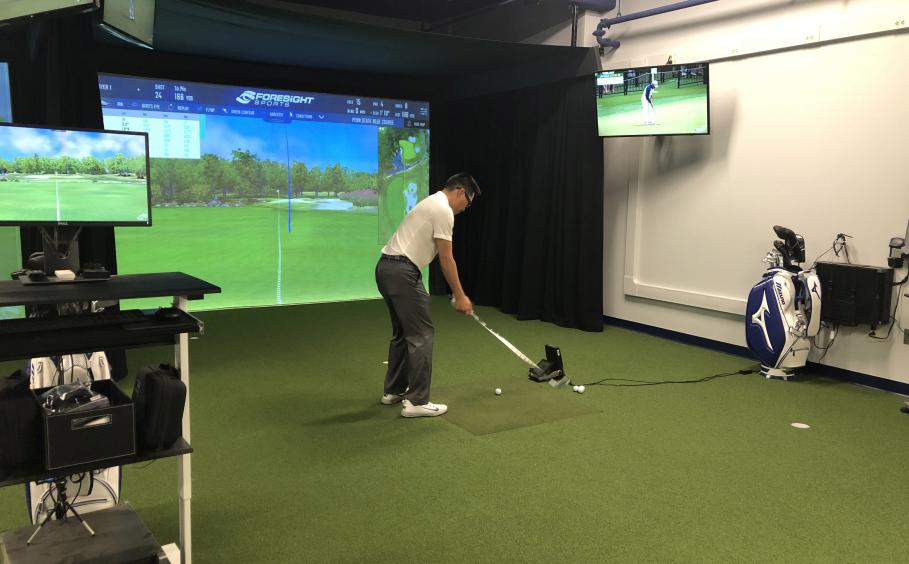
Why should I do research?
Participating in undergraduate research and creative activities enriches your educational experience by giving you unique opportunities to be intellectually challenged in a supportive space. By engaging in research, you will:
- Meet new people with similar interests, which can help to make this big University feel smaller
- Receive individualized mentorship from experts, such as graduate students, post-doctoral researchers, and professors
- Clarify your professional goals (even if that means research is not for you)
- Develop the top skills employers and graduate schools are looking for, such as problem solving, critical thinking, and effective communication
- Increase your chances of earning funding for graduate school
When should I do research?
There is no “right” time in your undergraduate career to get involved with research. Once you feel adjusted to the expectations and demands of college, you can dive in. Your research experience might look different depending on the amount of time you have left at Penn State.
First- and second-year students
- Gives you time to understand your research topic and refine your interests
- Gives you time to take on increased responsibilities over the years
- Can lead to strong letters of recommendations or references
- Gives you time to change your research
- Develops transferable research skills
Third- and fourth-year students
- Prior undergraduate classes may help you identify research questions that interest you
- Research may help you complete a thesis or other graduation requirement
- Can use relationships with faculty to identify potential research mentors

What is Research?
WHAT IS RESEARCH?
Research is independent study and discovery in a field of interest. In the sciences, research is usually conducted in a laboratory led by a Principal Investigator (PI) – this is the faculty member who runs a research project. Research addresses a hypothesis, or scientific question. New student researchers typically join an ongoing project in a faculty’s lab and are often trained & supervised by postdoctoral scholars & graduate students.
WHY CONDUCT RESEARCH?
- Conducting independent study complements your studies, your academic goals, and your professional goals
- UCLA is a world-class research institution with prestigious faculty conducting original research in their fields. Take advantage of the resources available to you
- Find out if a career in research is right for you
- Get valuable research experience to make you a competitive applicant for graduate or professional school
- Research can serve as valuable work experience to make you a competitive applicant for your future career
- Earn university credit and funding for your research
- Build meaningful relationships with and receive mentorship from faculty and lab members
Conducting research as an undergraduate is an excellent way to gain experiences and skills that will benefit you both academically and professionally. In addition to exploring your areas of interest, undergraduate research develops skills in collaborative learning and critical thinking. For students interested in pursuing graduate or professional school, undergraduate research is a way of expanding your education outside of the classroom and better preparing yourself for the rigors of graduate study. Even if you are unsure about graduate studies, conducting undergraduate research is a way of exploring your research interests and testing the suitability of a research career to your interests.
HOW TO PREPARE FOR UNDERGRADUATE RESEARCH
Some questions to ask yourself as you plan your research are:
- What subjects am I interested in and passionate about?
- How much time can I commit to research?
- Will I need financial support to conduct research throughout the summer and academic year?
- What do I want to gain from my research experience?
- How can I best prepare myself academically and professionally to do research?
- What courses should I take that will complement the work I do?
- What safety courses will I need to take to do research in my field or lab?
The better you plan your academic coursework, the better you will be able to organize your time for research. Whatever your future professional and academic plans are, gaining experience in research will enhance your application and your preparedness for more self-directed research.
Once you have evaluated your research interests and organized your time, the next step is finding a faculty mentor. As part of a collaborative research team, you will need to find the right position both for you and your potential research lab.
You can also take part in UC Online’s ‘Introduction to Research’ class available through the Cross-Campus Enrollment System (CCES). This introductory course will help you understand what research means and provide guidance in how to find a research position.
Do you have a question about getting involved in research? Send us a message through Message Center ( Topic: Beginning Undergraduate Research )!
College Info Geek
How to Do Research in 7 Simple Steps
C.I.G. is supported in part by its readers. If you buy through our links, we may earn an affiliate commission. Read more here.

It’s 2 am, and you’re on your fifth cup of coffee (or was it your sixth?). You’re crouched at a table in some dark corner of the library surrounded by fifteen open books. Equally as many tabs are open on your laptop, and you still haven’t written a word of the paper that’s due in 7 hours.
Many things can explain how you got to this point, including procrastination , poor organization , and a messy schedule .
Very often, however, the problem is a lack of research skills .
And it’s not your fault. High school does a poor job of teaching you how to do research, and most college classes do little better. It feels like you’re expected to figure it out through trial and error.
I think we can do better than that, however. In this guide, I’m going to show you the 7-step process for researching everything from a 10-page term paper to a final presentation. Not only will you learn how to do better research; you’ll also learn how to research more efficiently.
What Is Research?
Before we go any further, what is research?
At its core, research is an attempt to answer a question. This could be anything from “How can we reduce infant mortality rates?” to “Why does salt make food taste good?”
To answer your question, you consult books, academic papers, newspaper articles, historical records, or anything else that could be helpful. The broad term for these things is “sources.”
And, usually, once you’ve done the research, you present or summarize it in some way. In many cases, this means writing an essay or another type of scholarly paper, but it could also mean giving a presentation or even creating a YouTube video.
Even if you have no interest in academia, research is an extremely useful skill to learn. When you know how to do research, it’s much easier to improve your life and work more effectively . Instead of having to ask someone every time you have a question, research will help you solve problems yourself (and help others in turn).
Note: Research can also mean conducting surveys, performing experiments, or going on archaeological digs. While these activities are crucial for advancing human knowledge, I won’t be discussing them here. This article focuses on the research you can do with only a library and an internet connection.
The 7 Steps of the Research Process
Research can feel overwhelming, but it’s more manageable when you break it down into steps. In my experience, the research process has seven main steps:
- Find a topic
- Refine your topic
- Find key sources
- Take notes on your sources
- Create your paper or presentation
- Do additional research as necessary
- Cite your sources
Let’s look at each of these steps in more detail.
1. Find a Topic
If you don’t have a topic, your research will be undirected and inefficient. You’ll spend hours reading dozens of sources, all because you didn’t take a few minutes to develop a topic.
How do you come up with a topic? My number one suggestion is to create a mind map.
A mind map is a visual way to generate ideas. Here’s how it works:
- Get a piece of paper and a pen. Make sure the paper isn’t too small — you want lots of room for your ideas.
- Draw an oval in the center of the paper.
- Inside that oval, write a super vague topic. Start with whatever your professor has assigned you.
- Draw lines from the oval towards the edges of the paper.
- Draw smaller ovals connected to each of these lines.
- Inside the smaller ovals, write more specific ideas/topics related to the central one.
- Repeat until you’ve found 3-5 topic ideas.
When I write it out step by step, it sounds kind of strange. But trust me, it works . Anytime I’m stuck on a writing assignment, this method is my go-to. It’s basically magic.
To see what mind mapping looks like in practice, check out this clip:
Want to create a digital mind map like the one Thomas uses in the video? Check out Coggle .
2. Refine Your Topic
Okay, so now you have a list of 3-5 topics. They’re all still pretty general, and you need to narrow them down to one topic that you can research in depth.
To do this, spend 15 minutes doing some general research on each topic. Specifically, take each topic and plug it into your library’s catalog and database search tools.
The details of this process will vary from library to library. This is where consulting a librarian can be super helpful. They can show you how to use the tools I mentioned, as well as point you to some you probably don’t know about.
Furthermore, I suggest you ask your professor for recommendations. In some cases, they may even have created a resource page specifically for your assignment.
Once you’ve found out where to search, type in your topic. I like to use a mixture of the library catalog, a general academic database like EBSCO Host , and a search on Google Scholar .

What exactly are you trying to find? Basically, you’re trying to find a topic with a sufficient quantity and variety of sources.
Ideally, you want something with both journal articles and books, as this demonstrates that lots of scholars are seriously engaging with the topic.
Of course, in some cases (if the topic is very cutting edge, for example), you may be only able to find journal articles. That’s fine, so long as there are enough perspectives available.
Using this technique, you’ll be able to quickly eliminate some topics. Be ruthless. If you’re not finding anything after 15 minutes, move on. And don’t get attached to a topic.
Tip: If you find two topics with equal numbers of sources available, ask your professor to help you break the tie. They can give you insight into which topic is super common (and thus difficult to write about originally), as well as which they find more interesting.
Now that you have your topic, it’s time to narrow down your sources.
3. Find Key Sources
If you’ve picked a good topic, then you probably have lots of sources to work with. This is both a blessing and a curse. A variety of sources shows that there’s something worth saying about your topic, and it also gives you plenty of material to cite.
But this abundance can quickly turn into a nightmare in which you spend hours reading dense, mind-numbing material without getting any closer to actually producing a paper.
How do you keep this from happening? Choose 3–5 key sources and focus on them intently. Sure, you may end up needing more sources, especially if this is a long paper or if the professor requires it. But if you start out trying to read 15 sources, you’re likely to get overwhelmed and frustrated.
Focusing on a few key sources is powerful because it:
- Lets you engage deeply with each source.
- Gives you a variety of perspectives.
- Points you to further resources.
- Keeps you focused.
4. Read and Take Notes
But what do you do with these sources, exactly? You need to read them the right way . Follow these steps to effectively read academic books and articles:
Go through the article and look at the section headings. If any words or terms jump out at you, make note of them. Also, glance at the beginning sentences of each section and paragraph to get an overall idea of the author’s argument.
The goal here isn’t to comprehend deeply, but to prime your mind for effective reading .
Write down any questions you have after skimming the article, as well as any general questions you hope the article can answer. Always keep your topic in mind.
Read Actively
Now, start reading. But don’t just passively go through the information like you’re scrolling through Tumblr. Read with a pen or pencil in hand , underlining any unfamiliar terms or interesting ideas.
Make notes in the margins about other sources or concepts that come to mind. If you’re reading a library book, you can make notes on a separate piece of paper.
Once you’ve finished reading, take a short break. Have a cup of tea or coffee. Go for a walk around the library. Stretch. Just get your mind away from the research for a moment without resorting to distracting, low-density fun .
Now come back to the article and look at the things you underlined or noted. Gather these notes and transfer them to a program like Evernote .
If you need to look up a term, do that, and then add that definition to your notes. Also, make note of any sources the author cites that look helpful.
But what if I’m reading a book? Won’t this take forever? No, because you’re not going to read the entire book.
For most research you’ll do in college, reading a whole academic book is overkill . Just skim the table of contents and the book itself to find chapters or sections that look relevant.
Then, read each of those in the same way you would read an article. Also, be sure to glance at the book’s bibliography, which is a goldmine for finding additional sources.
Note: The above method is a variation on the classic SQ3R method , adapted slightly since we’re not interested in taking notes from textbooks .
5. Create Your Paper or Presentation
“You can’t turn in raw research.”
Research is crucial to crafting a great paper or presentation, but it’s also a great way to procrastinate. I had classmates in college who would spend 8 hours researching a 5-page paper. That’s way too much!
At some point, you need to stop researching and start writing (or whatever method you’re using to present your research).
How do you decide when to stop researching? There’s no strict rule, but in general I wouldn’t spend more than 30 minutes per page of the final paper.
So if the final paper is supposed to be 10 pages, don’t spend more than 5 hours researching it.
6. Do Additional Research (As Necessary)
Once you’ve started writing the draft of your paper, you’ll probably find a few gaps. Maybe you realize that one scholar’s argument isn’t relevant to your paper, or that you need more information for a particular section. In this case, you are free to return to researching as necessary.
But again, beware the trap of procrastination masquerading as productivity! Only do as much additional research as you need to answer your question. Don’t get pulled into rabbit holes or dragged off on tangents. Get in there, do your research, and get back to writing .
To keep yourself focused, I suggest keeping a separate document or piece of paper nearby to note points that need additional research.
Every time you encounter such a point, make note of it in the document and then keep writing. Only stop when you can’t get any further without additional research.
It’s much better to get a full draft done first. Otherwise, you risk suffering a cognitive switching penalty , making it harder to regain your focus.
7. Cite Your Sources
Whether you’re creating an oral presentation, essay, or video, you’ll need to cite your sources. Plagiarism is a serious offense, so don’t take any chances.
How to cite your sources depends on the subject and the professor’s expectations. Chicago, MLA, and APA are the most common citation formats to use in college, but there are thousands more.
Luckily, you don’t need to painstakingly type each of your citations by hand or slog through a style manual. Instead, you can use a tool like Zotero to track and generate your citations. To make things even easier, install the Zotero Connector browser extension. It can automatically pull citation information from entries in an online library catalog.
Once you’ve collected all of your sources, Zotero can generate a properly formatted works cited page or bibliography at just the click of a button.
For help setting up and using Zotero, read this guide . If you need further assistance, ask a librarian.
Go Research With Confidence
I hope you now understand how to do research with more confidence. If you follow the procedures I’ve covered in this article, you’ll waste less time, perform more effective research, and ultimately have the material for a winning essay.
Curious about how to use your research to write a great research paper? Check out this guide .
Image Credits: picking book from shelf
Our Services
College Admissions Counseling
UK University Admissions Counseling
EU University Admissions Counseling
College Athletic Recruitment
Crimson Rise: College Prep for Middle Schoolers
Indigo Research: Online Research Opportunities for High Schoolers
Delta Institute: Work Experience Programs For High Schoolers
Graduate School Admissions Counseling
Private Boarding & Day School Admissions
Online Tutoring
Essay Review
Financial Aid & Merit Scholarships
Our Leaders and Counselors
Our Student Success
Crimson Student Alumni
Our Reviews
Our Scholarships
Careers at Crimson
University Profiles
US College Admissions Calculator
GPA Calculator
Practice Standardized Tests
SAT Practice Test
ACT Practice Tests
Personal Essay Topic Generator
eBooks and Infographics
Crimson YouTube Channel
Summer Apply - Best Summer Programs
Top of the Class Podcast
ACCEPTED! Book by Jamie Beaton
Crimson Global Academy
+1 (646) 419-3178
Go back to all articles
How To Research Colleges: 4 Steps To Finding the Perfect School
/f/64062/1200x630/a69d9b3b40/how-to-research-colleges.jpg)
Researching colleges, while incredibly exciting, is no simple task. There are thousands of colleges and universities in the US and hundreds in the UK. While the vast array of options means you will be spoiled for choice — and that you can definitely build an application list that aligns with your goals and passions — it can be difficult to know where to start when it comes to navigating the often complex college research landscape.
We’ve come up with 4 steps you can follow to kick start your college research journey, each of which will help you narrow down on the best fit colleges and universities for you! But before we dive into the 4 steps, let’s first consider why college research is such an important part of your application process!
Why should you do College Research?
Every high school student knows that you should research different schools before applying. But why is it so important to conduct thorough college research? Put simply, it is because every college applicant is different . It is important to consider multiple factors when researching schools and what may be important to you when you finally decide upon your future college.
Since college research is integral to deciding where to apply, you should start researching schools as early as possible . Ideally, you should try and start this process at least one year before application deadlines (the earlier the better) to give you ample time to refine your list of preferred colleges .
Additionally, your interests in high school should help guide you in figuring out what to look for when researching colleges. Before even beginning your college research, you should take time to think about the classes and extracurriculars you currently enjoy, and may want to continue in college and beyond.
Finally, you should also start thinking about a way to structure your college research. After looking at some statistics, such as acceptance rates , and taking stock of your own academic profile, consider categorizing potential schools as either “safety”, “target”, “reach” or even “extreme reach”. Our college admissions calculator can help you classify your favorite schools into the above groups.
Interested in learning more? Attend one of our free events
Build your application strategy with the latest 2023-24 admissions trends & analysis.
Tuesday, April 23, 2024 12:00 AM CUT
Join this exclusive webinar to learn about the latest trends in college admissions and discover the key to getting accepted to top universities in upcoming application cycles!
REGISTER NOW
Step-by-Step Guide to Performing College Research
Now that we have actually established the importance of college research, next we must tackle exactly how to research colleges. This step-by-step guide will set you on the right path to discovering which college is the right fit for you !
1. Figure out your Preferences and/or Priorities
Before even beginning your college research, you should try to identify what exactly you are looking for in your ideal college . This will help you filter out the colleges that don’t interest you and to narrow down your research list.
Our college admissions calculator can help with this and may help you initially get an idea of what universities might be best suited for you. After checking out our admissions calculator, start considering a list of different factors that may help you determine what you are looking for in your ideal college and what you consider to be important while researching schools.
Some important factors include:
- Location: would you rather study somewhere rural, urban, or suburban? Would you prefer to live somewhere similar to where you grew up, or are you looking for an entirely new environment?
- Size: would you prefer a smaller or larger school? Are you looking to be a part of a large campus crowd or a close-knit community?
- Academics: are you looking for a university that is more focused on undergraduate teaching or research opportunities? What do you want to study? It is common for high school students to not be entirely sure what they want to study in college, but if you do happen to have a major in mind, make sure to research the best schools within your chosen field of study.
- Cost: is cost an issue for you? If so, are you eligible for any scholarships or for financial aid? While cost can be an important factor, do not necessarily let high tuition costs prevent you from applying to a school you really like.
Once considering these key factors, it may also help to start thinking about other minor considerations, such as:
- Social aspects
- Food and dining options
- Extracurricular interests
- Athletic opportunities
In regards to the athletic factor, if you are interested in pursuing sport at a varsity level in college, make sure to familiarize yourself with the recruiting process. Maybe even book a consultation with our team, who can help you leverage both your athletics and your academics to gain acceptance into your dream school.
Of course, the above lists and suggestions are far from exhaustive, but it is important to start considering your preferences in regards to these major factors before beginning your college research. Having an idea of what is important to you in your ideal college will help you narrow down your search before you even start.

2. Prepare a List and Begin your College Research
After figuring out your priorities and preferences, the next step is to actually start researching colleges. Keep track of each college you research and make notes of what you liked and disliked about that school.
If you know a current student at a college you are researching, consider reaching out to them to ask about their experience so far. As you complete your research, keep in mind your preferences and consider giving each school a rating out of five or ten for each factor.
Make a note of any special features you come across while researching each school, as this may help you remember what set that college apart from others as you review your list later down the road.
Don’t forget that there are many online resources at your disposal that can help you with your college research. Make sure to check out our website for university profiles, which cover a number of top US and UK universities.
You can also peruse our blog , which regularly publishes in-depth guides to help you apply to different schools. We also offer a number of eBooks that offer insights into some of the most prestigious schools in the US and the UK.
You could also venture over to our YouTube channel and take a look at our videos covering different universities and following a day in the life of current students.
Finally you can attend one of our webinars , during which our admissions experts and Former Admissions Officers offer tips and inside knowledge as to what top schools are looking for.
3. Refine your List and Consider Acceptance Rates
After performing your college research, it is time to narrow down your list. Once again, categorize your favorite schools into either “safety”, “target”, “reach” or “extreme reach”. Make sure to check out the US News or QS World Rankings to find out more about the reputation of each school.
Also ensure that you research acceptance rates in order to get an idea of how difficult it will be to gain admission. Remove any schools from your list that do not fit your needs as you conclude the college research process. At the end of this stage, you should ideally have a list of anywhere between ten and fifteen schools that fit your criteria.
4. Speak to a College Admissions Consultant
Now that you have your ideal colleges in mind, this would be the perfect time to book a free consultation with one of our expert Academic Advisors ! Not only can they look over your list to make sure that you haven’t missed any universities that might be a good fit for you, they can also provide a clearer picture of what you may need to do to increase your chances of admission to each of the schools on your list.
Researching universities is no easy task. However, if you start with these steps you will be on your way to figuring out your ideal colleges in no time!
What Makes Crimson Different
Final Thoughts
In the journey of researching colleges, we have delved into a world of possibilities, choices, and self-discovery. Navigating through the myriad of options, from campus cultures to academic programs, has been both exhilarating and daunting. As we conclude our exploration, it's evident that this process is not just about finding the right institution; it's about finding the right fit for our aspirations, values, and ambitions.
So, whether you're finalizing your application list or narrowing down your options, approach this journey with confidence in the research you've conducted, faith in your abilities, and a genuine eagerness to embark on a transformative educational endeavor. Your college years will undoubtedly become a chapter of rich experiences, lasting friendships, and unparalleled growth — all stemming from the foundation you've built through diligent research.
Key Resources & Further Reading
- Join our free webinars on US university applications
- Free eBooks and guides to help with the college application process
- How to apply to college?
- College application process explained
- When Should You Start Working On Your College Applications?
- How Many Colleges Should I Apply To? How to Make the Ultimate College List
More Articles
What do top colleges look for exclusive insights from a former admissions officer.
/f/64062/800x450/0a349379ad/how-to-stand-out-to-colleges.jpg)
Class of 2028 Regular Decision Notification Dates
/f/64062/800x450/b07c2f9591/early-action-decision-international-students.jpg)
How to Get Into University of Chicago: Essential Criteria & Guidance for Applicants
/f/64062/1920x800/6230b7bd62/uchicago-background.png)
US COLLEGE ADMISSIONS CALCULATOR
Find a university that best suits you!
Try it out below to view a list of Colleges.
Enter your score
Start your journey to a top university today, crimson students are up to 7x more likely to gain admission into their dream university book a free consultation to learn more about how we can help you get there.
Enter your SAT or ACT score to discover some schools for you!
- Photoshelter

10 reasons to do Undergraduate Research
If you haven’t thought about doing undergraduate research, here are 10 reasons you should be.
First, let’s discuss everything you think you know about research. Some common misconceptions about it are: It’s a thing only science majors do, researchers spend all their time in a lab, it’s really hard or it’s a waste of time with no real-life application uses.
“To us, undergraduate research is an educational experience in which a student collaborates with a faculty mentor,” explains Melissa Knapp, Augusta University Center for Undergraduate Research coordinator. “Together, they strive to answer an open-ended question or make a creative contribution to their chosen discipline.”
Yes, research can be done in a laboratory, but it can also take place in the field or even in an art studio.
Did we change your mind about research? If it’s never occurred to you that you should be doing undergraduate research, we’ve got 10 reasons why you should start thinking about it:
1. Career exploration.
The whole point of college is to get the degree that will land you the dream job, right? Use undergraduate research to connect with your future career as a student. You’ll have the opportunity to study and work alongside current professionals and experts. Most students use research to confirm their interests and sometimes explore new interests they’ve never considered before.
2. Foundation for graduate studies.
Undergraduate research prepares students for the experiences, tactics and work methods that they would typically experience in graduate school. Understanding the expectations of graduate school before you enter it is a great advantage.
3. Mentorship.
Networking with faculty members on research is a great way to build relationships with professionals who can turn into advocates for you. These individuals will be able to write high-quality letters of recommendation, introduce you to other professionals, vouch for your work and even become life-long friends.
4. Meet new students and faculty members.
In some programs, don’t be surprised to see the same classmates semester after semester. But if you’re interested in using college to meet new people outside of your usual circles, Undergraduate research provides opportunities to bring students from multiple disciplines together.
5. Learning by doing.
Research allows you to take what you’ve learned in the classroom and apply it to real-world problems and environments. You’ll have the advantage of understanding how to apply your knowledge before you even enter the workforce. All while earning academic credit.
6. Skill building.
Transferable skills are abilities that can be used in a variety of occupations and life-experiences, but they’re not always obvious in the classroom. They include skills like leadership, time management and critical thinking. While you may not sit through a lecture on time management in the classroom, undergraduate research allows you to hone these skills. Tip within a tip: transferable skills are great resume enhancers.
7. Interview preparation.
Undergraduate research provides unique experiences and engagements that can be referenced in graduate school application essays or job interviews. Students will be able to discuss their experiences and set themselves apart from the rest of the application pool.
8. Academic achievement.
Students often see an increase in their GPA and are more likely to complete their degree on time.
9. Publishing opportunities.
With research, you’ll be able to explore areas and topics in real time through original methods. This will give you the chance to submit your work for professional publication!
10. It’s fun!
“Undergraduate research opportunities help students of all majors explore research in an area that is interesting to them and supports their intended career goals,” Melissa says. “The research experience is different for each student.”
Ready to start graduate-level research in your undergraduate studies?
Learn more about the augusta university center for undergraduate research and scholarship at augusta.edu/curs.
You may also like
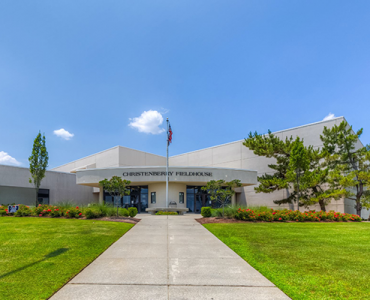
Kinesiology Degree: Is it right for you?
Spring 2021 Commencement
Center for Undergraduate Research & Scholarship
The Center for Undergraduate Research and Scholarship (CURS) supports faculty-led research and scholarly activity with undergraduates in a variety of ways including faculty and student development activities, sponsoring the monthly student research seminars, assessing the impact of student research on campus and by offering student research grants.
Copyright © 2024 Augusta University
- Share Your Story

JagNation is the nerve center of student life at Augusta University. We operate on a simple premise: We give you the information you need and want to thrive at Augusta University. Look for stories and tips to help you make the grade, land a job and enjoy your time here on campus.
We’re a community of students, learners, thinkers and doers, and we're always here to help you get the most out of your new home-away-from-home.
We are JagNation, and we hope you will be, too.
- Departments, units, and programs
- College leadership
- Diversity, equity, and inclusion
- Faculty and staff resources
- LAS Strategic Plan

- Apply to LAS
- Explore LAS majors
- LAS Insider blog
- Admissions FAQs
- Parent resources
- Pre-college summer programs
Quick Links
Request info
- Academic policies and standing
- Advising and support
- College distinctions
- Dates and deadlines
- Intercollegiate transfers
- LAS Lineup student newsletter
- Programs of study
- Scholarships
- Certificates
- Student emergencies
Student resources
- Access and Achievement Program
- Career services
- First-Year Experience
- Honors program
- International programs
- Internship opportunities
- Paul M. Lisnek LAS Hub
- Student research opportunities
- Expertise in LAS
- Research facilities and centers
- Dean's Distinguished Lecture series
- Alumni advice
- Alumni award programs
- Get involved
- LAS Alumni Council
- LAS@Work: Alumni careers
- Study Abroad Alumni Networks
- Update your information
- Nominate an alumnus for an LAS award
- Faculty honors
- The Quadrangle Online
- LAS News email newsletter archive
- LAS social media
- Media contact in the College of LAS
- LAS Landmark Day of Giving
- About giving to LAS
- Building projects
- Corporate engagement
- Faculty support
- Lincoln Scholars Initiative
- Impact of giving
So you want to get started with undergraduate research? Just ask.
Alyssa Shih is an atmospheric sciences major and a philosophy minor in the Class of 2026. On campus, Alyssa can be found on photography assignment for the Daily Illini or organizing events for the Student Sustainability Committee (SSC) and Illinois Student Organization of Meteorology (ISTORM). Aside from a love of atmospheric research, Alyssa is a violinist and does Chinese dance, traditional calligraphy, and book binding in her spare time.
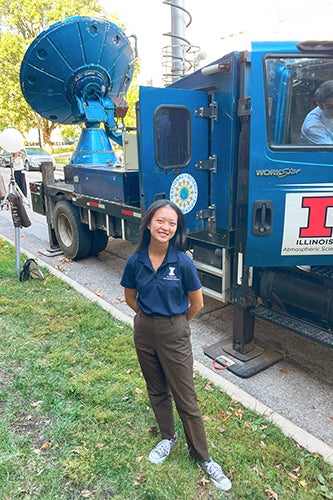
Because of that open invitation, I mustered the courage to bring it up to my advisor just to start the conversation. To my surprise, she immediately began brainstorming which professors studied what and who would have capacity for the following semester. After that meeting and an agreement to email professors to set up conversations, I visited the department head one office over to ask what he thought. Just like my advisor, he was quick to ask what I was interested in, offering names of professors and areas of interest and even offering to talk to some professors he was getting lunch with later. He reassured me that whoever took on a freshman would know that there would need to be learning along the way. Research works differently in every department, but for mine it was true that I just needed to ask.
After a few emails and conversations with upperclassmen, I found myself with a project, a massive dataset, and one credit hour of research on my course plan during my second semester of freshman year. I felt that underlying imposter syndrome, a sense that I wasn’t accomplished enough yet to be doing research, but I was never going to get there if I didn’t just start learning. I began teaching myself Python and navigating my huge dataset, running into so many questions and problems right away. I kept reminding myself that questions were meant to be asked and problems meant to be solved, so there was no shame in reaching out for help. My research advisor was more than patient with me, answering my questions and helping me solve those big problems.
Once I found firm footing in the technical aspects of what my research was, I took a minute during one of the weekly meetings to ask what the trajectory of the project was and why it mattered. Learning how to manage many gigabytes of data was intimidating, but I wanted to keep in mind what the big question was and how I could get there. Aligning the mini assignments and ideas my professor had every week with that big picture made the project really start to take form.
I’ve been doing research now for over a year, and I am so glad undergraduate research is so encouraged at the University of Illinois. Doing research led me to getting a Research Experience for Undergraduates through the National Science Foundation the summer after my freshman year, which strengthened my skills even more and gave me an opportunity to present at the national American Meteorological Society conference. Being able to ask big questions about the atmosphere and actually have the chance to answer them brings me a sense of fulfillment—this is something I do actually love to do that also means something to the world.
None of this would have happened if I hadn’t felt courageous enough to reach out to someone because no matter what it is, no one can say yes to you unless you just ask!
Blog Source
Read more first-hand stories from our amazing students at the LAS Insider blog .
- Privacy Notice
- Accessibility

Computing Research News
This article is published in the April 2018 issue.
Understanding Why Many Undergraduate Students Don’t Participate in Research
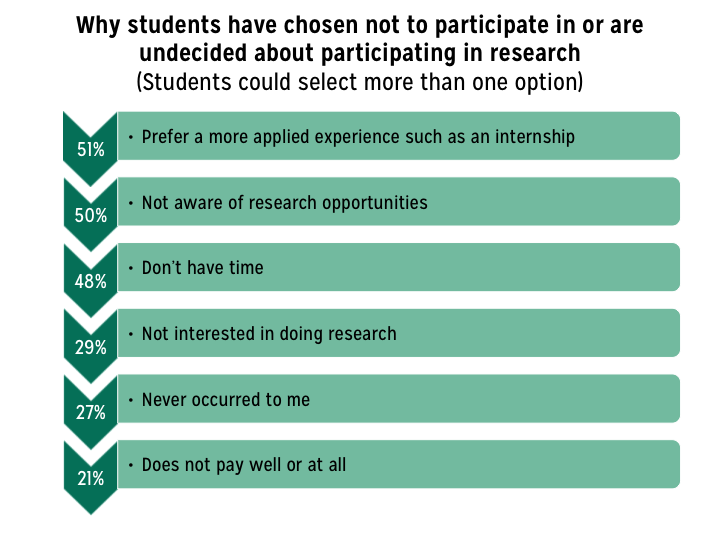
In CERP’s 2017 Data Buddies Survey , 9,610 undergraduate students indicated whether they had participated in a formal research experience during their college career to date. Interestingly, 72 percent of students indicated that they had not. Among students who had not participated in formal research, 34 percent indicated they planned to participate in formal research before they graduated, 23 percent indicated they did not plan to do so, and 42 percent of students were undecided (1 percent did not provide a response). Students who did not plan to pursue formal research in college or who were unsure about pursuing research explained why this is the case. The top three reasons included a preference for a “more applied experience,” such as an internship; a lack of awareness about research opportunities; and lack of time to pursue research. Other reasons included a lack of interest in research; the fact that research had never occurred to students as an activity to pursue; and the fact that formal research experiences do not pay well if at all.
Actionable items for departments to engage students in formal research include:
- Advertise research experiences on department websites, bulletin boards, and other public spaces. Research experiences can be both inside and outside of the department.
- Hold informational sessions on the benefits of formal research, particularly the benefits of formal research over internships.
Notes . CERP collected data from 10,282 undergraduate students who were majoring, minoring, or enrolled in computing courses at a national sample of universities and colleges via the Data Buddies Project . N = 9,610 students responded to the question: During your college career so far, have you participated in any formal research experiences? Formal research includes any experience you applied for and through which you worked closely with a mentor or research advisor. Yes or No. Students who responded “No” ( N = 7,361) were asked: Do you plan to participate in a formal research experience before you graduate from college? Yes, No, or Undecided. Students who responded “No” ( N = 1,702) or “Undecided” ( N = 3,059) were asked: Which of the following reasons explain why you are undecided about computing research or have chosen not to participate? Select all that apply. I am not aware of research opportunities available to me; I don’t have time; It never occurred to me to do research; I am not interested in doing research; I prefer more practical experiences such as internships; and It doesn’t pay well enough or not at all.

Privacy Overview
This website uses cookies so that we can provide you with the best user experience possible. Cookie information is stored in your browser and performs functions such as recognising you when you return to our website and helping our team to understand which sections of the website you find most interesting and useful. You can adjust all of your cookie settings.
College of Engineering
Georgia tech ai makerspace.

Using an approach unlike any other in higher education, Georgia Tech’s College of Engineering has created a digital sandbox for students to understand and use artificial intelligence in the classroom.
The AI Makerspace is a supercomputer hub that gives students access to computing resources typically available only to researchers or tech companies. It means hands-on experience for our students, deepening their skills and preparing them to be the new generation of AI professionals.
With the resources in the AI Makerspace, the College can redesign courses to incorporate practical AI tools and develop new ones that impart the essential principles of AI to all students.
The initiative is in collaboration with NVIDIA , one of the country’s largest suppliers of AI hardware and software — and a substantial investment. Students and faculty receive support through NVIDIA Deep Learning Institute resources, including faculty-run NVIDIA workshops, certifications, a university ambassador program, curriculum-aided teaching kits, and a developer community network.
The AI Makerspace also enables Georgia Tech to enhance or redesign courses to incorporate practical AI tools, along with develop new courses — both foundational and advanced — that impart the essential principles of AI to all students. The partnership between Georgia Tech and NVIDIA signifies a substantial investment. The allocated funds will be utilized for technology, including NVIDIA graphics processing units (GPUs), and infrastructure. S tudents and faculty will receive support through NVIDIA Deep Learning Institute resources, including faculty-run NVIDIA workshops, certifications, a university ambassador program, curriculum-aided teaching kits, and a developer community network.
The collaboration is part of the College’s commitment to nurturing a vibrant AI-powered university that will shape the future generation of AI professionals.
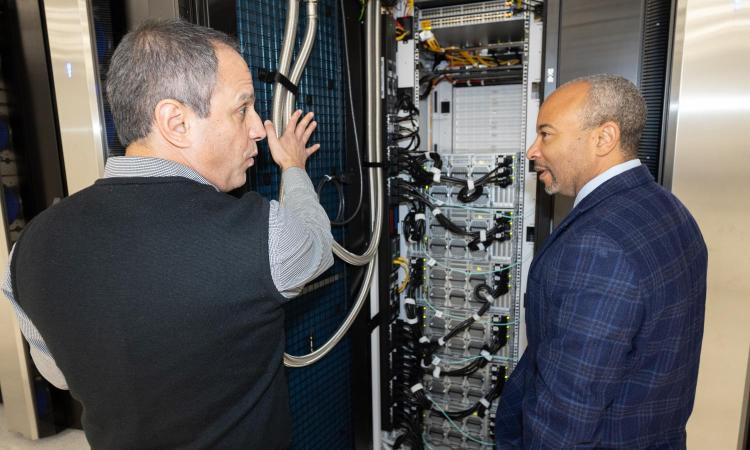
Georgia Tech Unveils New AI Makerspace
By giving students access to powerful supercomputers, Georgia Tech will teach AI to undergraduates in a way unlike any other university in the nation.
What Sets the Georgia Tech AI Makerspace Apart?

Educational Empowerment
In an era where AI is increasingly ingrained in our daily lives, the AI Makerspace democratizes access to heavyweight computing resources.
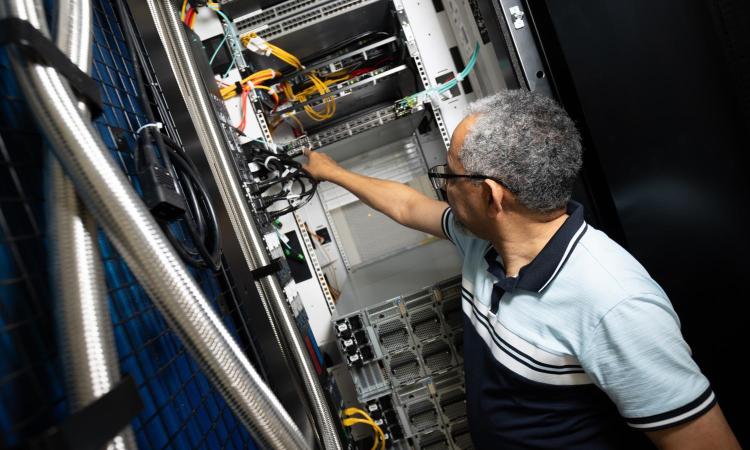
Training the AI Workforce
The AI Makerspace takes a dedicated approach to workforce development through curriculum-based study as well as independent exploration.

National Security
Harnessing the power of AI is a strategic imperative for national security. As nations strive to secure their positions as global leaders in the field, investing in AI education is critical for U.S. competitiveness.
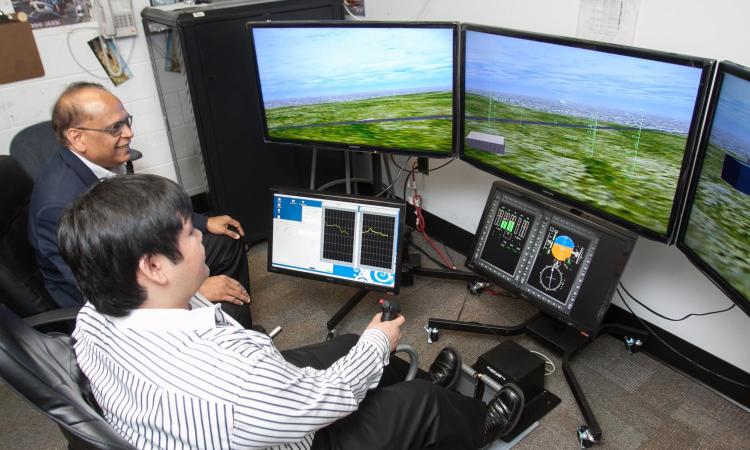
Interdisciplinary Focus
The AI Makerspace offers a unique opportunity for students to harness the power of AI technologies in ways that extend beyond traditional computing applications.
The Georgia Tech AI Makerspace is a dedicated computing cluster paired with NVIDIA AI Enterprise software. The software technology resides on an advanced AI infrastructure that is designed, built, and deployed by Penguin Solutions , providing a virtual gateway to a high-performance computing environment.
The first phase of the endeavor is powered by 20 NVIDIA HGX H100 systems, housing 160 NVIDIA H100 Tensor Core GPUs, one of the most powerful computational accelerators capable of enabling and supporting advanced AI and machine learning efforts. The system is interconnected with an NVIDIA Quantum-2 InfiniBand networking platform, featuring in-network computing.
Infrastructure support is led by Georgia Tech’s Partnership for an Advanced Computing Environment (PACE) .
It would take a single NVIDIA H100 GPU one second to come up with a multiplication operation that would take Georgia Tech’s 50,000 students 22 years to achieve.
20 NVIDIA H100-HGX servers, each with:
- 8 x NVIDIA H100 GPUs (SXM5 form-factor)
- 2 x 32-Core Intel Sapphire Rapids CPUs (2.8 GHz)
- 2TB 4800 MHz DDR5 DRAM
- 3 x 3.84 TB NVMe storage
- 1 x ConnectX-7 IB NIC (400 Gbps)
Total System:
- 160 NVIDIA H100 GPUs
- 1,280 Intel Sapphire Rapids CPU cores
- 40TB 4800 MHz DDR5 DRAM
- 230.4 TB NVMe storage
Frequently Asked Questions
What are gpus and cpus.
GPUs (graphics processing units) are specialized processors designed to handle certain complex computations efficiently, commonly used in tasks such as rendering high-resolution graphics and performing parallel computations in fields like machine learning and artificial intelligence. CPUs (central processing units) are the central component of a computer responsible for executing instructions, managing tasks, and coordinating the operation of various hardware components, serving as the brain of the computer.
GPUs have become prominent due to their exceptional parallel processing capabilities, which make them highly efficient for high-performance computing (HPC) tasks. Additionally, advancements in GPU technology have led to significant improvements in graphics rendering, gaming experiences, and visual computing applications, further driving their prominence in various industries and fields.
How many GPUs are in the Georgia Tech AI Makerspace and what makes them important?
Phase I of the Georgia Tech AI Makerspace comprises a total of 160 NVIDIA H100 Tensor Core GPUs. 20 NVIDIA H100-HGX servers contain 8 GPUs each. The benefit of GPUs is that they provide extremely performant accelerators designed specifically for AI, with a very large unified memory space that can accommodate very big models.
It’s also noteworthy that an important capability of AI is low-precision performance. These nodes provide roughly 640 petaflops (PF) of theoretical 8-bit floating-point for 8-bit integer (FP8/INT8) capability, combined with the 640 gigabytes of GPU memory per server.
Why are there both GPUs and CPUs in the Georgia Tech AI Makerspace?
CPUs and GPUs are optimized for different kinds of calculations, so it’s useful to have both available. Optimized software will perform certain steps of code on the CPU and others on the GPU to maximize performance.
CPUs are “standard” general-purpose chips that work well for many calculations. GPUs are specialized. A server cannot run without a CPU. The CPU handles all the tasks required for all software on the server to run correctly.
GPUs are accelerators with more focused computational hardware that rely on a separate host system to operate.
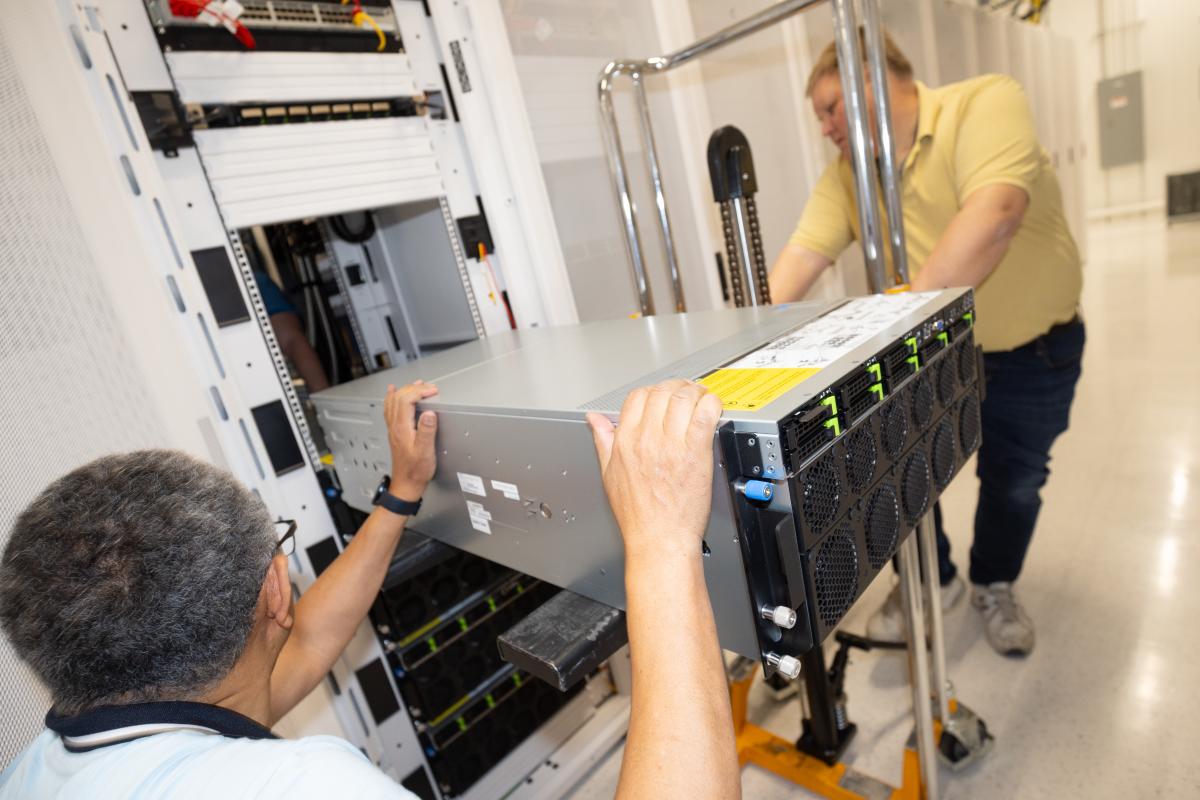
Who will manage the infrastructure of the AI Makerspace?
The AI Makerspace infrastructure will be supported by Georgia Tech’s Partnership for an Advanced Computing Environment (PACE). PACE provides sustainable leading-edge Research Computing and Data (RCD) cyberinfrastructure, software, and support for research and education requiring high performance computing and other advanced research computing infrastructure.
PACE is a collaboration between Georgia Tech faculty and the Office of Information Technology (OIT) focused on HPC.
Is the AI Makerspace scalable?
Yes. Each GPU can be physically partitioned into 7 GPUs (with 1/8 the capability of the whole). With 160 total GPUs, the AI Makerspace can provide 1,120 concurrent GPUs to allow large numbers of students access simultaneously.
How much power does the AI Makerspace require?
The new servers will draw about 140kW of power, compared to the 800kW PACE’s five existing clusters draw.
The theoretical 64-bit performance of the new hardware is 5.5 PF (petaflops, a measurement of computer speed of performing calculations). The existing PACE clusters altogether have about 4-4.5 PF of performance. This means that the new servers are significantly more energy efficient for the same computational capability than older systems.
Related Content
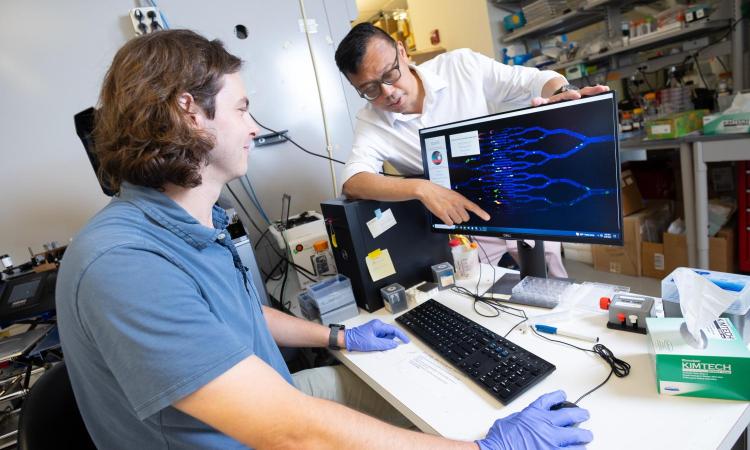
Minor Degree in AI and Machine Learning Available Summer 2024
The new minor degree program is a partnership between the College of Engineering and the Ivan Allen College of Liberal Arts, teaching AI technical skills alongside ethics and policy considerations.
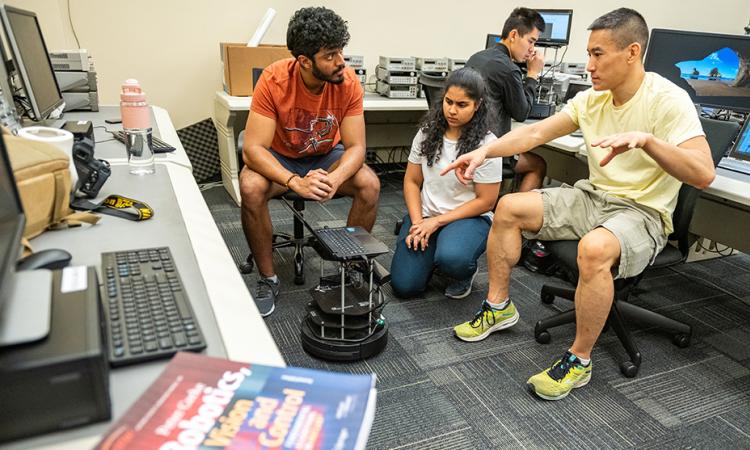
College Adds, Reimagines AI Courses for Undergraduates
In response to demand from its students, initiatives within faculty research, and increasing needs from industry, the College has created and reimagined more than a dozen courses to strengthen its AI and machine learning education.

IMAGES
VIDEO
COMMENTS
Undergraduate research isn't just for STEM subjects. Benefits of Undergraduate Research. Studies show students who participate in research earn better grades, are more likely to graduate and are ...
Kristin Kiesel, a faculty member in agricultural and resource economics and a mentor to Beppler, agreed: "There is no better way to recommend a student than by having them successfully complete an undergraduate research project.". 3. Learning to publicly advocate for and defend work.
Universities engage in research as part of their missions around learning and discovery. This, in turn, contributes directly and indirectly to their primary mission of teaching. Universities and ...
Debi Ogunrinde, C'16, W'16. Undergraduate research gives students the opportunity to learn about something that interests them most and take ownership of the thought, discovery, and delivery of new ideas to their field of study. In my case, research via the Social Impact Research Experience (SIRE) enabled me to explore the real-world ...
What students actually do when they gain "research experience" can vary widely depending on the nature and setting of the experience. From start to finish, the psychology research projects you learn about in your classes involve a lot of complex steps, completed by a team of researchers, over a period of time that can last several years.
1. Introduction. As the world evolves, the need for research grows, and it remains a factor of key importance in creating a knowledge-driven economy and supporting development initiatives as well as driving innovations across all fields [].It is becoming more and more important to increase undergraduate student involvement in research [].Academic institutions, faculty mentors, and students can ...
A lot of people start their undergraduate research by glancing at the faculty list and e-mailing multiple professors whose work seems interesting. Although this might get you a position somewhere ...
Research can be goal-oriented, as discussed previously, or grounded in the process. Humanities research is often the latter: we hope to gain a personal appreciation for the immense value and power of ideas. The notion of truth- seeking, a common justification for more theoretical research, implies the high value of the truth being sought ...
The ability to integrate theory and practice. However, participation in an undergraduate research experience also benefited students in areas that can reach beyond academia ( 3 ). Having tolerance for obstacles. Learning to work independently. Understanding how knowledge is constructed.
Step 2: Search for Schools Using an Online College Finder. After you've figured out your preferences, the easiest way to find schools that you like is to use an online college finder tool to search based on your criteria. One option that you might consider initially is College Navigator.
Why should a student do research? The literature demonstrates that students who participate in undergraduate research benefit in the following ways: Greater problem solving skills; Better understanding of research methods; Deeper understanding of the discipline; Greater confidence and independence; Better understanding of career and education path
For universities, a research component within an area of study allows for a broader educational experience. Students seeking a comprehensive college experience can explore the effects of applying new thought processes through study and testing. Students can use that experience to see the practical application of their classroom experience ...
Why Research Is Necessary and Valuable in Our Daily Lives. It's a tool for building knowledge and facilitating learning. It's a means to understand issues and increase public awareness. It helps us succeed in business. It allows us to disprove lies and support truths. It is a means to find, gauge, and seize opportunities.
First- and second-year students. Gives you time to understand your research topic and refine your interests. Gives you time to take on increased responsibilities over the years. Can lead to strong letters of recommendations or references. Gives you time to change your research. Develops transferable research skills.
Community: Undergraduate research provides opportunities to build a learning community with faculty and fellow students. Confidence: Undergraduate research builds confidence in your abilities within the discipline, and improves your overall perception of the discipline. About 50% of UCF undergraduate researchers continue their education after ...
What safety courses will I need to take to do research in my field or lab? The better you plan your academic coursework, the better you will be able to organize your time for research. Whatever your future professional and academic plans are, gaining experience in research will enhance your application and your preparedness for more self ...
Do additional research as necessary. Cite your sources. Let's look at each of these steps in more detail. 1. Find a Topic. If you don't have a topic, your research will be undirected and inefficient. You'll spend hours reading dozens of sources, all because you didn't take a few minutes to develop a topic.
1. Consult official college and university websites. The most accurate resource for researching college options is the official websites of the universities. Once you come across a potential university or when you simply want to research one in more depth, these websites are one of the best places to start.
Put Your Hard Work to Use! The research you conduct will be essential when creating your college list, preparing for interviews, visiting campus, and writing essays. As you do your research, purge any schools from your list that do not meet your needs. Ideally, you will end up with a list of 10 to 15 "number one" schools, each of which you ...
3. Refine your List and Consider Acceptance Rates. After performing your college research, it is time to narrow down your list. Once again, categorize your favorite schools into either "safety", "target", "reach" or "extreme reach". Make sure to check out the US News or QS World Rankings to find out more about the reputation of ...
Research experience consistently emerges as a top criterion for admission into graduate school and for employment in competitive positions, therefore it is important to understand the key steps to obtaining that experience. ... (if a smaller college) to discuss research possibilities. Speak to other students in the major about potential faculty ...
Use undergraduate research to connect with your future career as a student. You'll have the opportunity to study and work alongside current professionals and experts. Most students use research to confirm their interests and sometimes explore new interests they've never considered before. 2. Foundation for graduate studies.
My research advisor was more than patient with me, answering my questions and helping me solve those big problems. Once I found firm footing in the technical aspects of what my research was, I took a minute during one of the weekly meetings to ask what the trajectory of the project was and why it mattered.
Interestingly, 72 percent of students indicated that they had not. Among students who had not participated in formal research, 34 percent indicated they planned to participate in formal research before they graduated, 23 percent indicated they did not plan to do so, and 42 percent of students were undecided (1 percent did not provide a response).
Dr. Brandi Lenz, an instructional assistant professor and undergraduate program director in the Department of Geology and Geophysics at Texas A&M University since June 2022, overcame challenges including dropping out of college and navigating motherhood during her graduate studies. Her determination, fueled by childhood fears of natural disasters, led her to achieve her dream of teaching geology.
The Georgia Institute of Technology, also known as Georgia Tech, is a top-ranked public college and one of the leading research universities in the USA. Georgia Tech provides a technologically focused education to more than 25,000 undergraduate and graduate students in fields ranging from engineering, computing, and sciences, to business, design, and liberal arts.
4.8 hours. Average number of hours a day that U.S. teens spend using seven popular social media apps, with YouTube, TikTok, and Instagram accounting for 87% of their social media time. Specifically, 37% of teens say they spend 5 or more hours a day, 14% spend 4 to less than 5 hours a day, 26% spend 2 to less than 4 hours a day, and 23% spend ...
In an experiment at the University of Kansas, we had people think of how bad Saddam was and how bad 9/11 was in quick succession. The emotional connection of dreadful things substituted for the ...
Soaring above the clouds. Three different experiments will fly aboard NASA's high-altitude research planes known as WB-57s. The WB-57s can carry almost 9,000 pounds (4,082 kilograms) of ...
The study wasn't designed to answer questions about why these cancer types seemed to have the strongest ties to accelerated aging, but Ruiyi Tian, the graduate student who led the research, has ...